#hes just so compelling and it's unclear why. it's not an attraction thing it's something way more fucked up
Text
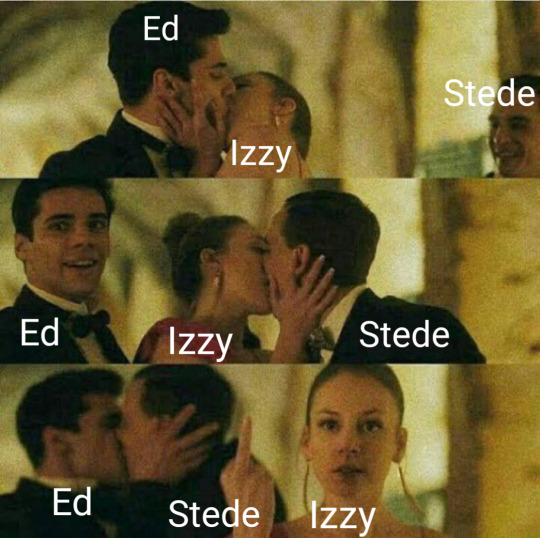
A fact about me is that I will always kind of ship an ot3 even if it doesn't actually make any sense
#the second fact about me is that i can't draw........but for anyone that can i present my case#would izzy and Stede kiss? do i actually ship izzy with anyone? do i actually find him attractive?#honestly it's a mystery. i am comforted by the amount of lesbian izzy girls. who i think feel the same in terms of like.#hes just so compelling and it's unclear why. it's not an attraction thing it's something way more fucked up#hmm idek the name for this#steddy hands#??#is that what was decided on#ofmd#woes of emily#i havent really engaged with shipping stuff in any real way#but that last post i reblogged sent me into the treph/acard tag and gave me much to think about.
383 notes
·
View notes
Text
Something i think really does get lost in the yentl movie, which in turn affects several more aspects that make the story so compelling, is the ambiguity present in the original story -- ambiguity both in the sense of the ending, of Anshel’s gender identity, and of the general moral values of the story. The fact is, Anshel/Yentl is actually a fairly morally ambiguous character. Barbra Streisand's Yentl is pretty much flawless -- not in any uncanny way, like I can certainly believe that someone like that would exist in real life -- but none of Yentl’s flaws really affect the plot. Other characters are fleshed out and given faults -- Avigdor is sexist and never really gets over it; Hadas is given her own plotline and grows, largely off screen, probably the most of the main cast. Movie Yentl is driven largely by a sense of doing what’s right: she teaches Hadas talmud, bc of course: having been herself prevented from studying on the basis of gender, why wouldn’t she teach her wife as well? Why wouldn’t she seek out a less sexist society (the Amerike ending is its separate thing lol, but that’s not what this post is about -- though while we’re here, Leah Napolin, who wrote the script of the Yentl play, was apparently approached to be a scriptwriter for the movie and, when asked what she thought abt the America ending said ‘Sounds great! She can move to America and get a job at the Triangle Shirtwaist Factory!’).
But what makes the original Anshel so compelling is the fact that he’s so driven by his own desires, often at the expense of other values. He makes no real attempt to expand who is allowed into the institution of religious education. He does what he does because he wants to study and thinks that he, personally, should be allowed to. In the movie he’s pressured into marrying Hadas in order to keep Avigdor in town and he never has sex with her or even kisses her, leaving Hadas “innocent”, but in the story, they fuck regularly and the reason they get married is he just wants her: he’s attracted to her, and he’s thrilled by the fact that she’s attracted to him too. Though I would argue that Anshel is treated as a likeable character by the narrative, Singer makes little attempt to justify any of his actions talmudically or socially. Leading up to Anshel’s marriage to Hadas, he worries about the sinfulness of it, including about the prohibition on crossdressing. He even thinks of running away, but his love for Avigdor, his growing affection for Hadas, and “a force and a stubbornness he could not overcome” hold him back. Anshel stands on the threshold of having everything he could ever want: he has the respect of the community, his friendship with Avigdor, the possibility of a loving wife and supportive in-laws -- of course he can’t bring himself to give it up.
By removing these elements, by showing the ending so unambiguously positive -- Yentl in America, Anshel and Hadas in a loving marriage -- it removes that uncertainty that made the original story so compelling. We don’t know what happens to Anshel, and at least on their wedding day, Avigdor and Hadas are deeply unhappy. And yet -- they name their son Anshel.
Singer’s story seems to avoid passing moral judgement on Anshel’s actions: whether they were good or bad remains unclear. Near the end of the story, when Avigdor questions Anshel on how he could bring himself to break so many commandments, and Anshel tries to explain himself, Avigdor understands that he may have the body of a woman but the soul of a man (the exact words used in the story!). But Singer doesn’t suggest that this means that Anshel should be fulfilling the commandments of a man or that this overrules the body -- in general, almost no questions are answered, though a great many are raised. Ultimately, it comes back to desire: the central tenet of a man’s soul, at least in Anshel’s mind, is the desire to study.
Barbra Streisand also changed Anshel’s general pleasantness: in the movie, he is immediately charming to everyone, and it’s deserved. In the short story, while he is fairly universally liked, I think he's much deeper as a person: at times much more unpleasant than in the movie, at times much more generous. He tells Avigdor that he thinks Hadas is neither smart nor pretty upon first meeting her, and he calls Peshe a cow. He disaparages Peshe in part because he’s jealous, and he generally doesn’t have an issue talking shit to get what he wants. On the other hand, we learn that he frequently buys Avigdor gifts, even before any romantic attraction is implied. He learns Avigdor's favorite dessert and buys it for them to share every morning, never letting Avigdor split the cost, a gesture that reeks of love and affection and something I’d say is never matched in the movie (tho the “this is one of those moments” montage is pretty gay -- but most of the gay stuff in it is driven by Avigdor).
Anshel’s also, well, I wouldn’t say outright cruel, but certainly snippy to Hadas. And Hadas, too, seems to occasionally say things that are meant to provoke Anshel -- both of them are usually talking about Avigdor. This is honestly a quite interesting dynamic -- we know that Anshel has found an academic equal in Avigdor, but there’s something in Hadas that can match him too. And she’s also just less pleasant: Anshel comments on the fact that she spends a lot of time looking in the mirror and is rude to the maid. I honestly don’t think Singer really likes her as a character lol.
Anyway, even if we view their dynamic just through the lens of their respective relationships with Avigdor, Anshel and Hadas are both looking at each other as having what they themselves can’t, or at least believe they can’t, have: Anshel can’t be in a romantic or sexual relationship with Avigdor, while Hadas could but lost the opportunity; on the other hand, Hadas no longer has much if any interaction with Avigdor, while Anshel spends all his time with him. But even beyond that: Hadas represents the feminine ideal that Anshel could never be, while Anshel, to an even greater extent than Hadas knows, represents the ability to stand up for what you want; although her desire is addressed more explicitly in the movie, we know that though she didn't fight the breaking off of her engagement to Avigdor she does protest when her mother hesitates to approve her engagement with Anshel. It’s multiple layers of desire and the classic queer story of “do I want you or do I want to be you”.
What makes Anshel so compelling in the story, both to the readers and the other characters, is how uncompromising he is on his desires. Avigdor and Hadas are both willing to settle. Anshel isn’t. It’s also what makes the ending so tragic, because he literally gets everything he wants and, in the end, has to choose to let it go. Not even because it’s better for others or for himself, but because his desire is not sustainable in the world he lives in: that’s the central tragedy.
One of the strongest lines in the film imo is at the end when Avigdor asks Yentl “What more do you want?” and Yentl responds, simply: “More”. This desire is at the core of the character and the story. What’s better: to have everything you wanted and be forced to let it go or to never have had it in the first place? Singer doesn’t answer this either.
11 notes
·
View notes
Note
Was likely that Alexander and Hephaistion's relationship was a Kathryn Howard/Henry VIII situation, with Hephaistion coerced by his family to become Alexander's confidant/best friend/lover. If he was forced into the relationship, do you think he eventually fell in love with Alexander, or stayed with him for power or because he was too scared to say no? The letter referenced by Aelian implies Hephaistion's considerable sexual influence; although Aelian isn't very reliable, do you think it likely?
Let me explain a little about the Macedonian court to explain why the above is unlikely.
Most folks are familiar with the institution of the Royal Pages, or “King’s Boys” (Basiliskoi Paides). Following NGL Hammond, these boys were c. 14-18. (Although if they had a strict age threshold, it’s hard to say; I suspect Hammond may have been unduly influenced by the Athenian institution of the ephebic military service, which was set at 18 to enter.)
Anyway, in addition to the Royal Pages, we also have a unit called the “Hunters” (Kynegoi), associated with Herakles. What they did is unclear, but seems to have been for boys about 18+, again, upper-class (Hetairoi). Various suppositions have been supplied, but I like Hatzopoulos’s (if I remember right) that they may have functioned rather like a “police force” outside Pella in the countryside of the lowlands, as officer-training. It makes a certain amount of sense, as it would be good experience for young men to learn to think on their own in dangerous situations. It seems like a logical extension of the Royal Pages. Alternatively (or perhaps in addition, as the Kynegoi were not—it seems—a military unit) boys exiting the Pages entered the Pezhetairoi (under Philip) or the Hypaspists (under Alexander): a specialist unit with picked men, especially those “bigger” than average (taller, more bulky). Hephaistion appears to have gone into that unit at some point.
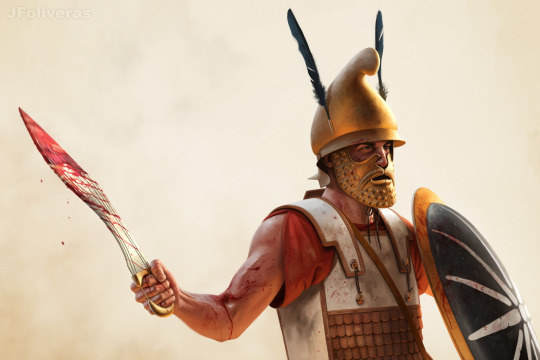
Now, as you can imagine, the competition and back-biting would have been ENORMOUS in either group, to get the attention of the king. But throw the prince into the mix, and it was more so.
In addition to the King’s Boys, royal princes appear to have had a group of young men semi-assigned to them by the king: the syntrophoi. These are picked contemporaries, almost certainly most from the Hetairois class, who were “raised” and educated with him. Meant to be his playmates…and eventually his high-ranking officers. It’s what Curtius refers to when he says Hephaistion was “raised and educated” together with Alexander. He was one of the syntrophoi. Each prince had his own set. We don’t know how many they numbered (probably varied), but IF the gymnasion recently discovered near/at Mieza is any indicator, a prince (especially the one designated as heir) might have as many syntrophoi as the king had Hetairoi: a hundred or so.
(In Dancing with the Lion, I didn’t want to juggle that many boys, but also, I wrote the book before that ginormous gymnasion was found. So while I did have a gymnasion there, it wasn’t anywhere near so large. I’d have reduced the number of boys anyway. There are enough unfamiliar names floating around as it is!)
So I wanted to explain how the court worked, in order to understand how Hephaistion would have entered into Alexander’s personal circle. What his roles might have been.
As a syntrophos of Alexander, Hephaistion’s parents may well have encouraged him to seek royal attention and approval, as that would reflect well on their family. But he wasn’t “chosen” to be Alexander’s best friend. He would have had to fight and elbow his way into that position. Competition was standard for Greek (and Macedonian) culture. Something about Hephaistion attracted Alexander. I doubt it was anything purely sexual. Hephaistion’s isolation at the court, if he was, indeed, of Attic or Ionian extraction, may have made him valuable because he didn’t have lots of family to divide his loyalties (from Alexander). But I’m sure it was more than that.
It’s okay if they just, you know, liked each other. 😊 Not everything is transactional.
We know that Alexander considered him very dear, and seems to have for a while. Sabine Muller and I disagree over when Hephaistion joined Alexander’s court, but even if we follow Sabine’s timeline,* which makes him an adult, not a boy or teen, he appears to have become important to Alexander fairly early.
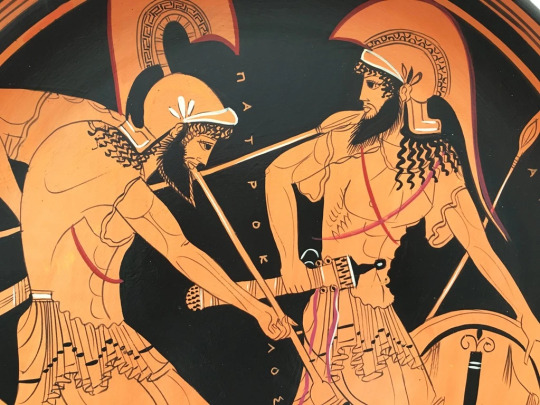
We don’t know how Hephaistion felt, except by extrapolation. I tend to believe the affection was mutual, not one-sided or opportunistic from Hephaistion. Here’s why:
1) Alexander was a smart guy, and a prince from day one. He would’ve learned to smell sycophancy in childhood. It’s a survival tactic. No matter how good of an actor Hephaistion may have been, long-term, an act would have worn thin. In fact, I think Hephaistion’s importance to Alexander was precisely because it was genuine. Alexander got lucky and found a true best friend—a rare thing for kings.
2) As for why they got along… IME, smart people in positions of authority (who are not narcissistic**) may put up with and find use for yes-men/women for a while, especially in “underling” positions. But they grow tired of them long-term. Hephaistion and Alexander were close for years. And, if I’m right and they’d met by Mieza (if not before), they were friends, even best friends,*** for 19 years. That’s longer than most modern marriages.
Therefore, I’ve always seen Hephaistion as someone uniquely able to keep up with Alexander, and who was honest with him (something Curtius asserts). In short, Alexander not only found that rare thing—a true best friend—he found one smart enough to match him, but who didn’t elicit a response from his over-developed “competition” gene.
As I’ve said before, all of that is why I find their story so compelling. In a competitive, calculating world, it seems refreshingly real.
---------------
*“Hephaistion,” Lexicon of Argead Macedonia, Heckel, Heinrichs, Muller, Pownall, Frank and Timme, 2020.
**Alexander was not a narcissist. I’ve seen him accused of it, especially lately with Trump as a model, but narcissists are rarely so successful (their own delusions prevent it), and he just doesn’t tick enough DSM diagnostic boxes, for me.
***Remember that, for the Greeks, philos was a higher position than erastes or eromenos.
#Alexander the Great#Hephaistion#Hephaestion#Syntrophoi#Hetairoi#Hypaspists#ancient Macedonia#ancient Greece#Macedonian court#Royal Pages at Macedonian Court#asks
37 notes
·
View notes
Text
Erica Yurken-bisexuality or compulsory heterosexuality (part 1)
(Spoiler warning!)

So I found myself really thinking about this character and this film, and how she interacts with the characters in the film. Namely various women and her designated love interest, Barry Hollis (who wasn’t originally a love interest in the book mind you).
For a while I headcannoned Erica as bisexual, the haircut and especially her interactions with both women and Barry at the time seemed to point to bisexuality. I definitely see Erica as lgbt, she is clearly not straight and I’m not the only one to see this. But then I began to dig a little deeper and analyse a bit more, was it my shipping lenses which made me think she was bi (even if she’s not into him, it was at least a well written and natural relationship progression and Barry seemed to genuinely like her) or was she actually bi? I’m here to analyse that based on what I’ve found.
To start off, the link provided and many others is what I used to base my assumptions on, you can find more by searching compulsory heterosexuality on tumblr. This is the link I’ve used. Within the first 5 minutes of the film, were introduced to miss Belmont, and she asks Erica her name. The children begin to make fun of her and miss Belmont tells them to be quiet, which Erica then tells her, her name. The exchange goes as follows ( 5:14-5:48)
Miss Belmont: “Erica, is a very beautiful name. Do you know that it means great heroine?”
To which Erica then faints and says
Erica (monologueing): “miss Belmont made me feel so special, I was in heaven..”
Very early on its made clear that Erica sees women differently, almost as if she is in love with some and very much enjoys female attention. However, with men this doesn’t seem to be the case, as with the first proper exchange between Erica and Barry (2:18-2:31)
Miss Belmont: “Erica, I know I can rely on you to show Alison around.”
Erica (rather excitedly and enthusiasticly)” sure miss Belmont!”
Enter Barry, who is also in the hall
“Yeah I’ll come too, after Erica gives you the freak show, I’ll show you the good stuff.”
During this, Erica is quick to pull Alison away and ignore him, while Alison seems to show interest in him. Erica is quick to dismiss him however.
Erica: “Alison, this is Barry Hollis. My stalker.”
Also something that’s worth pointing out Is when Alison is first introduced to the class and Is seated next to Erica, not only Erica is constantly staring at Alison once she sits down, but how she describes her (0:30-0:37)
Erica, gazing at Alison with amazement and infatuation (monloguing): Alison ashley was the most exquisite thing you ever saw. It was like she cast a light over everything around her”.
It’s made clear at this point that Erica has a clear interest in women, Alison especially. But Is quite dismissive in regards to men and their advances.
Another romantic interest in women is shown when Alison and Erica are discussing the school she wants to attend (Kyle grammar). The scene goes as follows (here)
Erica (monologueing): “I would have loved to go to a school like that, beautiful girls thinking beautiful thoughts. Was where I belonged.”
Once again, this very much comes off as romantically as opposed to jealousy. She clearly shows interest in women more so then men, speaking of which.
Fast forward to halfway through the film, when the bus breaks down and everyone is forced to get off. It’s been Made clear to the audience that Erica’s aspirations In life are becoming a great actress and a good place for her to start would be the camp play, Romeo and Juliet. Here’s an example of compulsory heterosexuality in the link provided:
“I’m constantly testing my attraction to men. I pick one or more conventionally attractive men in the room, and try to force myself to be attracted to them.”
Let’s see how this scene matches up to the description given (3:39-3:55)
Erica, looking at all the boys standing outside in front of her (monologueing): “ I decided to spend the time casting my Romeo, but things looked bleak they were all such repulsive options. Least Barry Hollis was a tall repulsive option, and there was no other choice for Juliet, was there.”
She then smiles, rather awkwardly, though it’s unclear if it’s forced. Comparing the scene with the example show above, gives off strong vibes that Erica doesn’t actually like Barry, but rather tolerates him. Not even calling him the exception to the rest of the “repulsive options” , instead as the least repulsive option. Like she’s picking whom she can tolerate most rather than feeling actually attraction to someone. Something to note is even though she fantasises about acting in the play Romeo and Juliet, when an actual romantic gesture happens on Barry’s part...Erica’s reaction is quite interesting (8:00-8:17)
Erica is sitting on a bench outside, thinking yo herself (monologueing): “ alisons kimono was perfect, it looked perfect, it felt perfect, just like everything else about her”.
Barry quietly comes up behind her and puts his hand on her shoulder, then leans in to kiss her. Erica responds by standing up, startled and pushes him away.
It’s interesting to note how even with jealousy, Erica still regards Alison as perfect. This scene is interesting, as even with how there has been jealousy towards Alison liking Barry (which I will get to in part 2), once Barry actually makes a move, she gets incredibly uncomfortable and backs off, tying in with another symptom of compulsory heterosexuality
“I like the idea of being with a man, but any time a man makes a move on me I get incredibly uncomfortable.”
When Erica is not dismissive or uncomfortable near Barry Hollis, she can be quite quick tempered with him and physically violent; hitting him when he sneaks up on her private phone call to her mum (4:18-4:24) or slapping him very hard after he upsets her by giving her the harsh reality that she can’t act (2:01) [howver as mentioned in the audio commentary, Barry’s intention was not to humiliate her, but to tell her the harsh reality because he loved her and cared about her to some extent]. Throughout this, even despite the major conflicts Alison and Erica are going through, the attraction to her and women seem to be much more realistic than those to men.
Here is one of the last scenes between her and another woman which is clearly shown to be romantic (save for Erica staring lovingly at Alison towards the end of the film and gently wiping her tear away, as well as helping her and being overall soft and gentle with her).
Erica is sat down at a bus stop, after a confrontation between her and Allison occurs in which she decides its best to give up on her dreams of being an actress and tries to escape camp. She then begins to have her last fantasy sequence in the film, wherein she is laying on a hospital bed and presumable dying, with her fellow teachers playing role of the nurses. Soon in the scene, miss Belmont ( dressed as a nurse) begins to stroke/caress Erica’s hair, while Erica makes this face, blushes and gazes into her eyes.
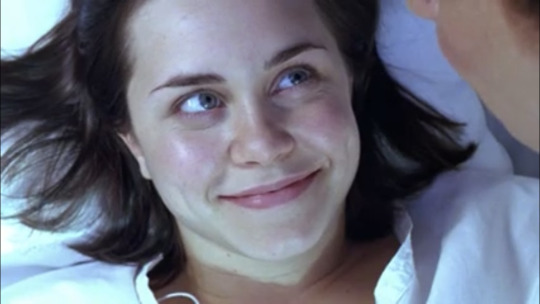
What’s interesting to note is that this doesn’t actually happen, this is what Erica imagines. She actively thinks about women in a romantic way, and even fantasies about her teacher miss Belmont in a homoerotic way (she might be her teacher but nothing comes of it and it’s one sided-making this not creepy). This seems to very much contrast how she views real interactions with men vs any interaction or view of women, real or in her imagination.
The last moment between Erica and Barry is after the play is finished. There is some small talk before something happens (5:51-5:57)
Barry Hollis: look about the other night...next time, I’m sticking the tongue in (implying he would like to perhaps date her)
Erica then responds with this face
It’s somewhat ambiguous as to how Erica feels about this, the expression on her face is that of a slightly uncomfortable smile or confused genuine delight? With how she has responded to things like this in the past, I feel compelled to agree with the former. One could make the argument that she is only 14, so things like this seem very big for her and mature, and it’s also a possibility.
Conclusion: Erica Yurken gives off many vibes that she may only be interested in women, and that her attraction to men is only a result of compulsory heterosexuality. However I am not done with this topic, tomorrow I will be dabbling into why Erica may be bisexual and discuss those too. Scenes which were purposefully left out here was so I can compare tomorrow and see how they fare. As here I only wanted to focus on compulsory heterosexuality and wlw/same sex attraction
Thank you for listening to my ted talk, I am extremely tired so I’m going to sleep, goodnight. Part 2 will be up sometime tomorrow (this was written 31/8/2020)
#hating alison ashley#robin klein#erica yurken#alison ashley#barry hollis#lesbian#lesbian?#lgbtq+#headcannons#compulsory heterosexuality#comp het#compulsory heteronormativity#lesbian woman#lgbtq community#same sex attraction#same sex relationships#my post
5 notes
·
View notes
Text
Lucifer Season 5 Episode 5 Review: Detective Amenadiel
https://ift.tt/3javrER
This Lucifer review contains spoilers.
“For now I’m going to stick to police work and avoid anything God related.”
Religious imagery, innuendo, and irony have long been part of the Lucifer gestalt even though the investigations rarely take the detective and the Devil anywhere near houses of worship. When they do, however, the depth of spiritual growth woven into the narrative typically reveals a profound level of character development. With that in mind, season five’s fifth episode “Detective Amenadiel” covers so much emotional ground and seems to provide closure to Chloe and Lucifer’s relationship problems that it’s easy to forget eleven episodes still remain in the season.
The abandonment and deception themes remain focal points, and though there’s always the danger that some threads run too long, here we get some resolution with the most compelling arc of all – Chloe’s feeling that, like Lucifer, she’s been manipulated by God for His own purposes. However, it’s Amenadiel’s role in bringing Chloe and Lucifer back together that really drives the episode.
Putting Lucifer in a convent full of novitiate nuns just seems too easy, and the opportunity for off-color remarks and snide comments about his Father almost too juicy to ignore. But this investigation finds Lucifer sidelined at the precinct with Dan doing the boring detective work while Amenadiel goes into the field with Chloe to not only solve the murder of Sister Victoria of the Sisters of the Divine Path but to discover the truth behind Lucifer’s vulnerability around the detective. The sisters’ seeming lustful attraction to Amenadiel works because it’s so out of character for Lucifer’s brother, and once Sister Francine admits that when she looks at Amenadiel she feels closer to God, the pieces to the puzzle begin falling into place.
Read more
TV
Lucifer Season 5 Episode 4: It Never Ends Well for the Chicken
By Dave Vitagliano
TV
Lucifer: God Takes Charge As Dennis Haysbert Joins Season 5
By Dave Vitagliano
It’s certainly understandable that those unfamiliar with the show might accuse the writers of promoting anti-religious values, but therein lies the fundamental irony of Lucifer. Once we get past the misconception that the nuns find Amenadiel sexually attractive, it becomes apparent that the powerful emotions they feel when they gaze upon his angelic face is actually their love of God reflected back at them. It’s this revelation that ultimately leads to Amenadiel’s conclusion that so beautifully reunites the Devil and the detective. Though he’s ordinarily on the periphery of most murder investigations, it’s Amenadiel’s inductive reasoning that leads Chloe to finally understand the true nature of her relationship with Lucifer. Sherlock would be proud.
The impact goes deeper still once Lucifer and Chloe really open up to one another, but what gives this mini-arc its power is that along with Lucifer, we’re given hope that the relationship can be saved. “I want us to be together,” she tells him, and what makes this scene so poignant is that Lucifer doesn’t yet know he’s been relieved of his obligation as Hell’s warden. He’s learned from Dan that there are no shortcuts toward obtaining anything meaningful and selflessly tells Chloe to take all the time she needs even though he believes time is something he doesn’t have.
Of course, it’s Amenadiel’s explanation about Chloe’s unique ability that compels her to accept the most startling truth of the situation – instead of thinking about herself as a manipulative gift, she now understands she’s been given something even more important in this scenario. The resolution of this tragic conflict is handled beautifully, and while Lucifer’s penthouse has provided numerous opportunities to present his devilish side, here, sitting alone at his piano playing a plaintive tune, the space takes on deeper meaning. Once Chloe sits directly next to Lucifer on the bench, his emotional vulnerability is unmistakable and the power that she’s always exerted over him, intentional or not, now becomes something they share. When she shows him the truth that “You choose to be vulnerable around me,” Chloe opens a door for their union to ascend to a much higher level.
Though detective Amenadiel doesn’t impact Mazikeen and Linda resolving their troubled pasts, the decision they make to help each other is just as captivating as Lucifer and Chloe’s story. It’s fascinating to watch the wall Maze has built around herself slowly dissipate as Linda relates her own guilt ridden history. It wouldn’t be Maze, however, if there weren’t some speed bumps along the way, and though she storms out after Linda bares her soul, we know she’ll be back. And when she does return, Maze has her own bombshell to drop in a way only Maze can.
We’ve watched as Dr. Linda puts her own emotional baggage aside to help any number of the celestial crew cope with the vagaries of life among the human race, and it’s become clear that something from her past has returned to negatively impact her relationship with Amenadiel and Charlie. While Chloe’s understandably been caught up in the drama surrounding her issues with Lucifer, and quite honestly has never really been that close to Linda in the first place, the bond the doctor and the demon have formed reaches a new level here. Once Linda reveals her teenage pregnancy and subsequent decision to give up her baby, Maze takes charge and the counseling roles reverse. “Is that why you think you’re going to Hell?” she asks, and though this afterlife scenario that Linda conjures up in her head has provided some interesting possibilities, the reality takes an unexpected turn.
She is, after all, a private investigator by trade, and when Maze lets slip that “she seems good,” we know Linda has a huge decision to make that could have far reaching effects on her life moving forward. Of course, there’s no question that Amenadiel will totally support Linda should he learn the truth, but the dilemma now centers around whether or not she should insert herself into her daughter’s life. Maze wouldn’t be Maze if she didn’t attempt to squeeze some information out of a witness, and for a moment, it’s unclear how far Maze will go questioning Adriana. And though it appears this mini-arc could resolve itself here, Linda suddenly realizes that this whole meeting is really about the ultra emotional Maze working out her issues with Lilith, leaving Linda and her daughter as potential collateral damage.
The rather pedestrian murder-of-the-week follows the trend of cases that revolve around somewhat simplistic motives, but that really matter because Lucifer has become so much more than a police procedural. Yes, the secret room in the cellar has a certain Rosemary’s Baby cultish feel to it, but the highlight of the murder investigation occurs when Amenadiel allows Hank to shoot him multiple times before revealing his majestic wings. He tells the killer to “have faith,” and whether this is meant as preparation for prison or Hell isn’t really that important. He’s made it clear that he needs to help make the world a better place for his son, and while getting a murderer off the streets is certainly a good thing, Amenadiel establishes an even more significant role through his involvement with Chloe and Lucifer.
“You need to give your daughter the choice,” Mazikeen suggests to Linda, advancing the idea that remaining in the background constitutes a level of deceit. In this new age of split seasons and much hyped mid-season finales, “Detective Amenadiel” keeps the momentum going, and though the Lucifer/Chloe problem appears to be settled, at least for the time being, there’s still plenty of personal discord to fill the remainder of season five’s first half. Now, let’s see if we can get Maze sorted out and back on track.
The post Lucifer Season 5 Episode 5 Review: Detective Amenadiel appeared first on Den of Geek.
from Den of Geek https://ift.tt/2ErASjE
1 note
·
View note
Text
FNAF canon and TOTC FNAF au 1: Won't you be my Friend?
This is the AU of which the canon and TOTC FNAF stories prexist together. In other words, they are one story rather than a real collusion. "A dear of light, that's what you are." that is what Timothy's mother, Anna Whidden, use to say to him. Before...she parished. One may moarn, one may pass on, and one would be vengful. In 1982, Anna passed leaving her two children behind, Timothy Michael Whidden and Maxwell Ernest Whidden. Timothy was 8 years old, his brother was 10 in 1982. Their grandparents, their decease father's parents, were meant to keep care of them. They were under custody, but never took them in. The grandparents would only pay the bills for the house the two children sleep in, and only come to give them money for food and clothes before leaving again. It is unclear why it was this way, it could have been so many things. Timothy was always in his home, with only the company of his dear bear. A special, gold bear, a plush Fredbear. One that his mother has given him a long time ago. This bear is his only friend when it came to being home, but among other friends, he will always the best friend. Timothy had two other friends, Charles Emily and William Afton. Both boys were the same age as Timothy. Charles was a very playful boy, he loved to play games of all kinds, but he always loved to play toys with the two other boys as the favorite game. William was a smart boy, quite imaginative within a world of his own. All though William was not spry boy, due to his weight, he was never left behind by his friends. A trio of a perfect childhood friendship. That is, until 1983. The Fazbear company was rather a busy company in the 80s and 70s, having two locations and one under way as of 1983. It is owned by Fredric Cawthon, under help with co-owner Dan McFly Whidden and Tech/robotics maker Peter Calvin Whidden. However, the Whidden brothers seemed to be the true heart of Fazbear's. The main Fazbear loction, of that time, would be Fredbear's Family Diner, which is the location where the brothers mostly worked. These brothers are Timothy's lost uncles, or uncles he was never introduced too. They would only find out about Timothy until October of 1983, Peter was the one to find Timothy locked away and frightened in his workshop. That day, is when Timothy and his uncles grew as familias relatives. Maxwell was found out as well, but rather furious. Not because he was not being given any attention, but because this would mean he wasn't going to be able to control and torment his brother anymore. Maxwell wanted to always be undercontrol for his own gains, he was young. With the death of both his father and mother, he blamed Timothy since there was no one else to blame. Such young mind like his could not comprehend the fact that life takes, it always has to be someone's fault. It felt quite nice to blame someone you least favor, so that is what Maxwell did. This control lead him in wrong directions, as well as becoming a troublesome child with a group of very troublesome children. Which he did have a rather mischievous that always followed his lead. It was nearing Timothy's birthday in November of 1983, but things were very rocky. Charles was at the hospital to treat a cancer he had, and William's family were going through a rough patch of divorce and separation. Timothy was alone on the days nearing his birthday, scared and alone with only his bear. But even his bear could not stop what happened next. Maxwell, Timothy's own brother, and the children that followed Max stuffed Timothy between the jaws of the Fredbear animatronic. Thus crushing Timothy's skull. William saw it all, as he and his mother just walked in as a surprise for Timothy. They came in just a moment befor witnessing Timothy's skull being crushed. It was quite the scene, seeing a friend's relative remove him from the jaws of a robot. Witness the relative screaming and crying out in pain, as they held your dying friend in their arms. William was in shock, disbelief, he never seen such a loss nor felt it ever in his life. He never seen so much blood, nor has he seen a man in so much pain. Will was never the same after that, on the inside. After the death of his friend, he had to share it with Charles once he was out of the hospital. They both moarned, but could not do anything. Slowly and eventually, William and Charles began to drift apart. Then one day, Charles was just missing entirely on 1984. Rumor went and gone that someone took him, or killed him. But William could not share anything about Charles because of how far apart they already were. In 1985, on William's 10 th birthday, William was brought to Fazbear's second location since the first was promptly shut down due to low costumers. William was not a fan of the toy animatronics, but did not hate them. He always loved the Fazbear robots and mascots, they always striked him curious and made his mind wonder. On William's birthday, he was registered for a personal party. His mother wanted it to be a special party, so William would not feel any less due to lack of friends. William's mother would leave Will alone to not make him feel restrained in a Fazbear place, she knows how much he loves these things. He felt alone at his party at first, until a gold rabbit with a purple bow and starey purple vest came along to greet William with cake. William was overwhelmed with joy, he never seen the mascot before and it was not at all robotic. It sparked hope in William, and made him feel, truely, special. William wanted more company from this version of Bonbear (springbonnie), and so he did. The rabbit sat by his side and told William fictional stories of many sorts. Then the rabbit offered William a "breif tour" of the place. William, of course, agrees to it. It was indeed a tour, but William got to even see the original robots that were pushed out for the toys. They were withered, but William was not petrafied. He found it very interesting that they were in this state. Out of curiosity, William would try to look inside of them, which he would breifly see something he wasn't suppose to see before the rabbit stops Will. The rabbit had not a single disturbance in its tone of voice, it just simply told will that the tour is over and it is time to go home, in a playful tone. Will was then brought back safely, and after that party, Will never came back due to his family moving around. William had a rough few years of elementary and middle school, since his family kept moving. Once settled, high school was only hell. The school work was rather a breeze for Will since he is rather intelligent, but the students always bullied him due to his weight and smile. Will only smiled just to seem friendly and maybe gain friends, yet he gets punched for it and ending up with a chipped tooth. After high school, he tries to find jobs since colleges were just too costly to afford right away. Which he had factory jobs, it was enough to get by and he gets into a Technology college. He was young, but unhealthy, he was told he might become diabetic if he doesn't fix his eating habits. He gets to it, going through a keto diet until he got better, yet he lost track of eating sometimes since he has college, a factory job, and an unstudy money balance. So he was both thin and had dark eyes to match. William was tired of his old name, he is not the William he once was so he gave himself the new name of Dave Miller. He thought it would be better that way. After graduating college, Dave quit his factory job to find a better job. Despite his smile, he was not sound of mind. His tired psyche, and his mind of wonder truely became mixed. So his applications had rather strange fill-outs. At this time, Fazbear was long gone, until it started to spark back to life again. Dave finds this out rather quickly, his mother always knew he loved that place, so she was the one to give the news. However, his applications were always rejected. Years and years his applications were rejected. So long, in fact, he was there when both the official and fan websites of the Fazbear company were started. He learned and studied both websites tiredlessly, since he had nothing else to do but wait and only test out his tech skills here and there. Then... One faithful day, Dave was finally up to interview and the next he was hired. His happiest day will continue on to the happiest days. But he would be rather odd under all of this satisfaction, he knows there is something wrong that makes him believe it is something right. He is not a murder, he is strange, just compeled towards more, dark areas and cracks. Simply attracted to the mysteries, knowing full well that they may be true. Even attracted and has addmiration for the one that made his childhood wonders come to life, which somehow that one, that man, is still walking on earth and among the living.
#fnaf#fnaf oc#fnaf au#fnaf story#fnaf Dave Miller#fnaf William Afton#TOTC Peter#my oc#my universe#TOTC#Trilogy of the Company#TOTC au#my writting#writting
9 notes
·
View notes
Text
i like my body/ and it is not your body
My weekend was great, thanks! I ran ten miles each morning, and running is the closest I get to approximating what it feels like to have properly firing neurons. I listened to two loves of my life, Jon Lovett and Stacy Abrams (about whom I will write more another time, but don’t wait for that; go give her project to resist voter suppression your money here). I read books to the literal piles of humans I have made, dizzy with the sheer acreage of their cheeks. I had a conversation with my autistic preschooler about Ariel — the first proper conversation my daughter has ever initiated with me.
So, I’m doing okay right now, thanks for not asking while I proceed to say some stuff.
I’m saying this not because my voice is the one that needs to be uplifted in a conversation about either fat-shaming or ectopic pregnancies, but because I went to bed thinking about the distressing common thread between the current weird preoccupation of other seemingly uninvolved parties with the two phenomena. And because, while I think James Cordon, God among men, gets this, and I know that other survivors of miscarriages, ectopic pregnancies, and the million other situations in which abortion has been a Godsend — as in, the best option or only tenable option for a specific human being at a specific point in time —I’m just thinking that maybe the people who need to hear it, literally cannot hear it enough, or from enough people, until they have plunked their toned, tailored-suit-wearing man asses into some comfortable seats, ones from which it is somewhat labor-intensive to emerge, and sat a round or two out.
The first is this: you, fat-shamer, and you, pro-lifer who, surprisingly, is willing to “let God decide” if a college student with a fertilized egg threatening to rupture her fallopian tube and kill her should live or not — since the role your God presumably had in supplying the skill and technology to save her life wasn’t a clear enough sign of His will, and despite the fact that God apparently can’t be trusted to supply Her children with appropriate sexual and gender identities — you get a single body and that is your body. And that body, and control of that body, are just going to need to be enough.
Look: there’s no reason to believe that someone who is insulting people over their weight has any strategic goal related to either health or weight loss. To claim otherwise, to walk back your antagonistic bullshit with a sanctimonious “but I’m concerned for [their] health!” : this a is mindbogglingly bad-faith argument. Because the human being you are shaming, or, honestly, any person acquainted with how people feel when you’re shitty to them, will point out that humiliating people and promoting discrimination against them doesn’t effectively motivate them to change their behavior, let alone the physical body they inhabit, and you will say — what, that it should?
At that point, it will become clear that what you, the fat-shamer, want, is for these people to change their bodies in response to your comments about whether or not they can see their penises or get laid or give you an erection; that, basically, what you are doing is doubling down on a system in which if you are a woman, you should feel embarrassed and subhuman if your body is an inadequately hot commodity for the consumption of this unnamed but all-important (male) consumer. (You, right? It’s you to whom we’re trying to make our bodies presentable?)
And if you, the fat-shamed, are a man, your worth is still determined by men, this time the ones who supposedly know how successful you are at getting women to have sex with you based on their opinions of your body, and who have decided that this is the metric by which your worth is established. (Side note: straight guys who know so much about what women want, I’m guessing you don’t want to rethink your premise that your estimation of other guys’ bodies is the one that matters when determining what women find attractive, but it would behoove you to do so. If there were one thing women don’t like (there’s not!), it would be straight guys mansplaining our sexuality to us).
Basically, what fat shaming is about in your sixties (because that is how old Bill Mayer is, friends!) is what fat shaming is about in sixth grade. It’s just one more way that a certain group of people, a group with relatively more power than others and a deep fear of losing it, maintain that power by saying: I am going to tell you what matters, and I am going to tell you whether or not you have that thing that matters, and I am going to make it so painful for you to not have it that you will remake your body to get me off your back, because it is weirdly important to me to exert this control over you.
My furtive eighth grade crush got fat shamed in middle school, and he was pretty fat. But, you know, so did I, and I’ve never had a medical doctor express concern for my weight. Discouragingly, it barely registered with them when I was losing my hair and hadn’t had a period in a year. But other helpful randos, from grandmas to girls in my gymnastics class, started calling me fat at age four, and the only way I was able to stop them was to self-regulate so effectively that by the time I went to college, I was throwing up when I “lost control” and chewed too many pieces of Juicy Fruit.
That’s the goal of fat-shaming, fat-shamers: someone who has accepted your right to tell them who they are and what their worth so unreservedly that she can graduate Phi Beta Kappa on the one hand, but still believe that she is “too fat to sit down” on her graduation night. And — as one person with a running leitmotif I like to call “pathological need for control” running through my adolescence and early adulthood to another —- can I suggest you slow your roll and take a look in your own goddamn mirror?
I can’t speak to why a person might experience exerting control over the bodies of other people as catharsis, why what they need to self regulate is to make someone else feel worthless. I can only imagine that this bullshit behavior comes from the same sense of existential dread that makes two missed days at the gym feel like that a night in one of those sky cells on Game of Thrones to me. But I can be compassionate towards you and also take a hard pass when it comes to “tolerating” your “opinions” about the value of people around you, or your right to patrol the size of their bodies or to determine that they need to be harassed into having a body you like better. Your feeling about thigh gaps or whatever is your deal, but the fact that you think other people should be treated badly or should endanger their health in an effort to make their bodies acceptable to you is also, 100%, your deal, and not the problem or the responsibility of the people in those bodies. Take your body and do whatever you want with it, but shut the mouth part of it first.
Similarly: I’m not going to explain to anyone why a fertilized egg in one’s fallopian tube is 1. not a viable pregnancy and 2. not something to “watchfully wait" over. “Watchful waiting” is appropriate when the risks of intervention are significant, or the benefits unclear, or both. In the very few cases in which this might be what a doctor would advise, that decision is made though a cost-benefit analysis with the mother, because the mother is the patient being treated. There is no “child’s life” to consider because, as with any pregnancy, but maybe especially an entirely nonviable one, there is no child yet.
If you are anything but shocked by the idea that someone should be expected to “wait and see” if their medically treatable and potentially fatal medical condition will kill them or not because of how another person, living in another body, feels about the situation, then you don’t give a shit about life. Not the life of that woman, which you are endangering. Not the lives of any existing children she has or partner she has or parents or students or siblings or friends. What you are saying, again, is that you decide what this woman’s life is worth — and your expectation is that she accept that when it comes down to it, your random feelings about her body both define the value of that body and should be factored into the clinical decision making of her medical provider.
As with our fat-shamers above, I’m just wondering where it came from, this idea that you’re entitled to control the bodies of other human beings, and the weirdly aggressive efforts to do so.
Are you ok, Representative? It seems to me you are not.
It doesn’t even matter that an ectopic pregnancy is not viable. Because pro-life arguments are about “preserving life” the way fat-shaming is about “promoting health”: that is to say, they’re not about that at all. It’s about being unwilling to either take responsibility for working out whatever damage you have, or to acknowledge that the way you are choosing to work that damage out is by violently exerting control over the bodies and lives of others.
Forcing a woman to carry a pregnancy she doesn’t want is violent whether that pregnancy is only somewhat likely, as it is in the case of a viable pregnancy carried in a country with the highest material mortality rate in the developed world, or pretty effing likely, as in the case where the pregnancy is lodged in a tube that will not accomodate it. When you legally compel another human being to risk her life carrying a pregnancy in her body because of how you feel, that is violent.
I want to have compassion for you, person who sees no better option than hurting other people to deal with whatever it is life has handed you. I’m something of a poster child for irrational or detractive ways of dealing with the parts of the world I don’t like: see above, where a teenage permutation of me was vomiting gum bile. But I also feel like we don’t serve anyone by looking the other way while they evade the responsibly we all have to handle our own shit.
Certainly you get that, right? If a person’s body size, the pregnancy they carry, their health status, are all issues of personal responsibility, surely you, too, can own up to the fact that you have this thing where, instead of overdoing it at the buffet — or, I don’t know, getting pregnant in the wrong part of your body? — you insist that other people’s bodies should be altered to your specifications, and that you should decide if those bodies are fed, or wear shorts, or receive medical care. You can acknowledge that this is a weirder and less palatable approach to managing your dark feelings than is eating too many carbs or whatever it is you think we’re all doing with our insufficiently controlled, overweight, inconveniently fertile bodies. You can set aside that weight-loss tea you’re sipping and consider that maybe, the one who’s “ready for a change” is you.
11 notes
·
View notes
Text
The Magnus Archives ‘Far Away’ (S04E01) Analysis
Whatever I was expecting as our season opener, that wasn’t it. Of course, it fit perfectly. It just wasn’t what I had anticipated. We got a new perspective on an issue we’ve seen growing throughout the show, and not nearly as much of an idea what season 4 is going to shape up like as I’d thought we might. Come on in to hear what I have to say about ‘Far Away’.
Having a follow-up to ‘Dreamer’, as well as a proper introduction to Oliver Banks, seemed a bit of a surprise. Certainly, after Martin’s teaser trailer, I had expected the Archival staff. Instead, we got a character we haven’t ever met before, although we have heard of him. But honestly, his perspective and his story may well be very important going forward. Oliver was a character, much like Jon, who hated what he was becoming, and who eventually had to make a choice. But the exact nature of that choice, or even the conclusions to which he came, are more nebulous than they might first seem.
I think we can use Oliver’s statement and experiences as one person’s approach to being the unwilling pawn of one of these larger powers, how he tried to escape, and how he may have ultimately even managed it. Of course, we also would have to address whether or not escape is all it’s cracked up to be in this universe.
Let’s get into the story, shall we? He more deeply elaborates his own experiences, and how his ability to see the portents of death all around him (likely marking him as either an avatar of the end, or at least claimed by it) not only intruded on his dreams, but increasingly his waking life. His visions and his dreams exhausted him, leaving him barely sleeping and not getting restful sleep even when he was sleeping. The claim of one of these powers, even over someone developing into an avatar, could not be called ‘benign’.
And yet, Oliver also felt a sense of hominess and rightness about what he saw and what he experienced. As much as it horrified him, part of Oliver did genuinely like the power. I think that’s also a critical part of the avatar. They have to be someone who is both still frightened by the power that claimed them, yet also attracted to it. I think Jon is very much this case. His tendency toward paranoia makes him the sort to hate and fear the notion of being watched. He hides himself behind brusqueness and anger and academia because the notion of being known and vulnerable is terrifying. But he also finds the ability to be the one who knows to be intoxicating. He took to the compulsion rapidly, and his only misgivings appeared when he compelled people he cared about. Compelling perfect strangers didn’t bother him in the least. From there, it was an easy slide to embracing his powers more and more. How wonderful must it have been for him to make logical leaps with little to no evidence, and just be right? To never need to get a translator. To KNOW and SEE and not have to share anything of himself in return. So he fears the Beholding, but he also very much loves it.
Oliver seemed to fall more to the fear side than the love side. While his prophetic powers were somewhat ‘homey’, the exhaustion and the brutality and the desire to be free of his visions seems to have outweighed whatever appeal there was by far. So he dreamed of a place with no people and no life whatsoever: Point Nemo, somewhere out in the middle of the ocean, the farthest place on earth from life it is possible to be.
But when Oliver tried to get there in his lucid dreams, he would feel something begin to pulse and squeeze on his leg. The claim over him was clearly strong, and clearly not about to let him go so easily. He had to witness the End going about its work. This is something else we’ve seen with Jon, although in Jon it more resembled physical signs of withdrawal when he couldn’t constantly record. The Beholding has a job it needs Jon to do, much as the End had a job it needed Oliver to do.
But something Jon seems to have played with far more than Oliver is the parameters of that job. Jon takes statements directly, he records them himself, he has assistants who record, and may or may not be able to feed the Beholding in his stead. By finding his powers appealing, he’s found ways of making them work more for his own personality. Whether that’s something particular to the Beholding that the End lacks, or whether Oliver was so repulsed by his powers that he refused to even try to explore them is unclear.
So instead of either pushing his boundaries or exploring his powers, for good or ill, Oliver instead decided to escape them. He couldn’t do it in his dreams, but he might be able to physically, by boarding a research vessel to Point Nemo after finding one of the scientists, watching him die, and stealing his identity (noticing Oliver’s increasing callousness about death is also notable, as it seems that even though he’s horrified by what he’s seeing, it’s more a concern for himself than a concern for others. Actual death didn’t seem to bother him nearly as much by the time he physically saw a corpse.
It’s also interesting to note that, in the ocean, he didn’t see the veins. Instead, he saw something impossibly large and moving. Could this be a creature of the Vast, the same thing seen in ‘High Pressure’? It seems distinctly possible, and if that’s the case, then it’s interesting to note that the ocean seems to have very overlapping themes of the Vast and the Isolation. Point Nemo has clear feelings of the Isolation, but the thing in the water indicates something of the Vast. I really want to see the relationships between the Fairchilds and the Lukases more deeply explored, because these two powers either seem like natural allies or natural rivals.
But, even more interestingly, Oliver’s ‘end’, perhaps didn’t seem to be the End. Although death by falling space debris seems fairly heavily leaning that way, Oliver still walks. He could be one of the End’s reanimated corpses, yes, but there seemed to be another and more tantalizing possibility:
Oliver escaped at last.
When he talked about spiders getting into his head and giving in to what ‘She’ wants, he seemed to be speaking from personal experience. It seems to me that, at some unspecified point, the Web may have got its hooks into Oliver as well, just subtly. But when facing being truly claimed by the End, is it possible that the Web snuck in and claimed him instead? Could he be its agent now? Twisting avatars of other powers into tools of the Web seems absolutely in line with the modus operandi of that power.
And who is ‘She’? It’s notable that Oliver personified both the Web and the End, the former being female and the latter being male, but it’s not clear why he did this. Was he talking about avatars? Did he just feel more comfortable assigning primal terrors genders? Could this imply that Annabel Caine (the Web potential-avatar from ‘Thought for the Day’) is going to play some role in this season?
It’s unclear. Oliver’s exact role, allegiance, and whether or not he managed to escape the End’s claim is unclear, as Georgie interrupted him before he could finish. But I find that idea very fascinating, because it ties into a theory I’ve had for a while that it is possible to shake the claim of a power, but likely only by giving oneself wholly to another power. If that’s the case, it’s a potential way out, but it may also be very much a case of out-of-the-frying-pan-and-into-the-fire. But I also like that theory because it emphasizes the centrality of choice to this story. People make choices, even in extreme circumstances, and those choices have weight. Jon had a choice. He’s not quite human, so the End can’t claim him, but he’s not quite monster, so surviving on his own may be impossible. Is the choice to give in to the Beholding? Perhaps. Or perhaps Oliver was also implying that Jon too could chose to defect. After all, Jon of all people also knows what it’s like to have the spiders in his head.
But I have the feeling that, for Jon, the Beholding was the escape. The Web laid the initial claim, after all, and the Beholding has protected him from it. So did Jon choose the Beholding when he started breathing again?
It’s entirely possible. But I also have to wonder about the sound effect that played as he started to breathe. While it could be the recorder, it doesn’t sound quite right for that. It almost sounds like Peter Lukas’ sound effect, that atmospheric whistling. Is it possible that Jon, in an effort to keep himself at least a little human, allowed the Isolation to bring him back? Could this be Martin’s doing, making some agreement with Peter to bring Jon back, and mixing the sound effects of the Lonely and the Beholding in the process? Could this be part of Elias’ deal with Peter, and whatever Martin is doing is totally separate? Could something completely different be happening, and I’ve got the wrong idea entirely?
It’s unclear. The end of the episode leaves us with a ton of questions, and very few answers.
And it gave us no context for the teaser, which must have taken place at some point before the episode. We don’t know who Martin was talking to, why he said goodbye in such a definitive manner, or what he’s chosen to do. The easiest answer, as I said before, is that he tried to give himself to the Isolation (likely the power that frightens him the most) in order to save Jon.
But after Oliver’s statement, I have to wonder if it’s that easy. Because Oliver was DESPERATE to escape the End, and if he really did manage to defect to the Web, it was only in the extreme instance of having a satellite crashing into him that he managed to do it. Martin categorically doesn’t want to give himself to the Isolation. He wants to stay with the Beholding, and as I’ve said before, he talks to it like a friend. He treats the Beholding in a way that no one else does, and he even served as a fill-in Archivist. The Beholding not only has its hooks deep into him, but it has done for longer than any character we know of save Elias.
I have the feeling that, if he has tried to make this bargain, the Beholding wouldn’t let him go so easily. I also feel that Jon wouldn’t give him up that easily. Not after losing Tim and Daisy and Sasha. If there’s even the remotest chance he can find Martin and get him back, he’s going for it.
Or maybe, as I said, what happened with Jon has nothing to do with Martin. Maybe Martin’s deal during the teaser is a different path entirely. Honestly, I sort of hope this is the case. Seeing Martin get particularly proactive in new, creative, and potentially dangerous ways, intrigues me. Martin has been a very passive character throughout the story, and even his brave moments have been allowing other people to do things to him. I really would like to see a Martin who starts making decisions and stands and actions, even if they end badly. Because as Oliver proved, the horror is inescapable, but as Tim proved, there are things one can do within that horror to reclaim one’s agency. Having a Martin who is decisive, who will be more than support but instead perhaps a genuine foil for Jon would be very interesting indeed.
Jon and Martin have established themselves as the cornerstones of the show, and I really hope we get both a deeper exploration of both of them, and an actual exploration of their relationship this season. The idea of Martin saying his goodbyes and then getting sidelined or removed from the story in some self-sacrifice just seems a bit too clichéd for me. Far more interesting is the notion of a proactive Martin, one who makes choices and mistakes and may even stand in opposition to Jon at times.
As for Jon, I really want to see him continue to struggle. While he could wake up and just be a monster, again that feels too clichéd. Oliver said it himself: Jon has choices to make. The horror and the crux of this series has always been choices. Jon became what he is by choosing it. Maybe he can make his position as avatar work for him the way that Gertrude did. Maybe he can escape as Oliver may have done. Or maybe he’ll fall. But I want to continue to see a Jon who is human-ish, who struggles with his choices and his connections. I want to see that he still cares for Georgie, Martin, and the rest of the Archival staff. I want to see him try to protect them, even if the ways he goes about it are increasingly inhuman.
I want to see all the remaining characters—Jon, Martin, Melanie, Basira, and Georgie—face hard choices, make the wrong ones, make the right ones, and maybe no matter what face something they don’t want to be. But I want them all around at this point to make those choices.
What I liked about the way Tim left the show was that he got to do it on his own terms. That is really the only victory state that can be hoped for in the TMA world, and to see him achieve that keeps the show from being a depression-fest of all the characters being railroaded into their worst possible endings. Yes, bad things happen to these people (often and repeatedly), but it is their responses to those bad things that make them the characters we find so compelling.
102 notes
·
View notes
Text
Is Ogata supposed to be the objective viewer for each of the groups looking for the gold?
As I’ve been reading Golden Kamuy, and re-reading it something that I’ve been wondering is what each character is supposed to bring to the table for the readers. For example, Sugimoto is the reader’s stand in for a non-Ainu who is learning about Ainu culture through his interactions with Asirpa. While Asirpa is the reader’s guide to Ainu culture as well as an individual looking for a different role for herself in her society not based on gender norms. So an idea that has been floating around in my head has been the following. What is the significance of Ogata is to the reader? He likely is doing several different things but I’m just going to throw out one here today.
The recent chapters may have hinted at his reason for wanting some of the gold, which throughout the series, seems to be one of his objectives. Since he really hasn’t revealed all that much, we have to take at face value that he wants some of the gold, but not a lot of the gold.
What is more interesting though is how he has been going about the quest for the gold. Ogata played an very interesting role in the beginning of the manga as he introduced the 7th, in particular the 27th regiment as being involved in the hunt for the gold. He snipes the unknown small fry convict before he can reveal anymore information to Asirpa and Sugimoto and then does try to take out Sugimoto. Even though Asirpa is there, he chose to chase after Sugimoto, the adult instead.
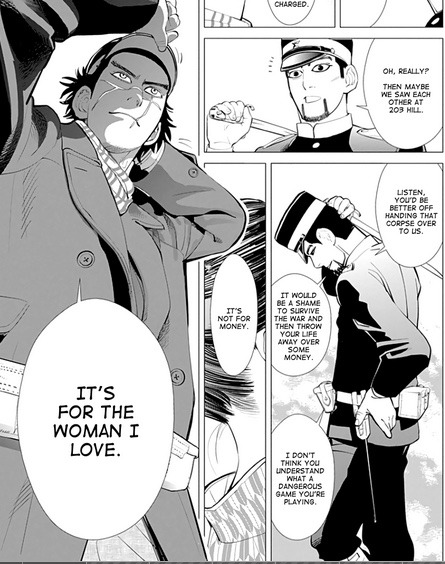
I find it interesting that Ogata stalled a bit trying to find out more information about Sugimoto. For example, when he asked Sugimoto what unit he was from, he truthfully told him he was from the 1st, which put Ogata at an information advantage at least. Since they were both at the battle for the 203 m hill, Ogata does give him one last chance to back out before taking Sugimoto as a serious threat in the quest for the gold. I find it interesting that Ogata tells him it would be a “shame to survive and then throw away your life over some money.”. This is interesting as this is before he deserted but clearly he by this point, had aligned himself with Tamai & co. to go after the gold sans Tsurumi. Does he say this b/c it is clear that Ogata is part of an “us” so a larger and more organized group, while it is clear that Sugimoto is going alone with Asirpa to assist? Is he trying to devalue the amount of gold as well? To refer to it as “some money” implies that it isn’t that important to him or he wants to let Sugimoto know he’s entering a very dangerous game and he can’t emphasize enough how dangerous it is? We get Sugimoto’s reply that it isn’t for the money but the woman he loves (who just happens to benefit greatly from the money).
Either way, his conversational stalling, immediately pays off when Sugimoto breaks his arm and has him pinned to the ground ready to stab him with the bayonet. As soon as Asirpa calls his name, he is immediately able to identify who he is and recognize that the reason why his arm was broken and he was pinned down b/c he attacked *that* Sugimoto the immortal.
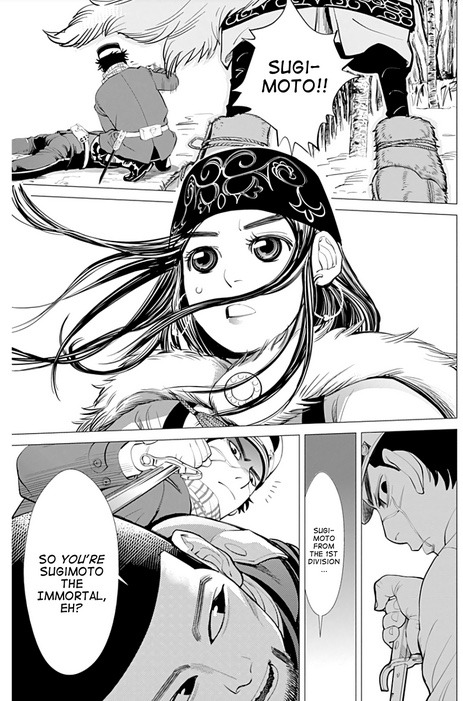
If Sugimoto had lied and simply said he retired or that he left the service after the war, he would have been a little less identifiable. I would feel that since he is no longer in the service, it isn’t at though Sugimoto needed to treat Ogata like a superior, he could respect him but as he was no longer in the the military he wouldn’t have to answer his question. But, without thinking about it, Sugimoto’s honesty gets him in a pinch later on, since Ogata was able to inform Tsurumi the identity of his attacker. Once he was captured by Tsurumi, Sugimoto then lies and states he was in the 2nd, realizing that by being honest with Ogata, he gave away too much information about himself to the 7th. And since he lied to Tsurumi, it implied that he did not feel compelled to me honest with Tsurumi as a much more highly ranked individual.
I won’t spend most time on this, but after being injured and then recovering, Ogata becomes a “liberated” man according to Noda-sensei. This then explains why he went in search of Tanigaki, since he suspected he was involved in the disappearance of Tamai & co and that Tanigaki would rat them out to Tsurumi.
After surviving his sniper battle with Tanigaki, Ogata then lurks off for a bit and re-emerges in Barato when Hijikata and Nakagura are there in search of one of the tattooed skins based on a rumor.
Now if he was actively seeking Hijikata or found running into Hijikata there a bonus it is unclear. What is clear is that once he identified HIjikata, he went to a great deal of effort to really attract his attention.
The way that Ogata behaved on Barato, is almost out of character for him. He’s incredibly assertive; cutting the ass-crack chin police chief, humiliating him publicly and then showing off his skills for all to see. Though he does not speak for the entire time, which does fit with his personality.
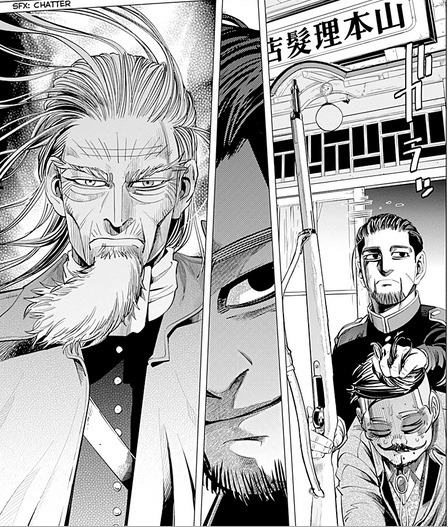
He just has to make sure that he gets Hijikata’s attention by pulling the police chief out into the street and then show off his rifle skills.
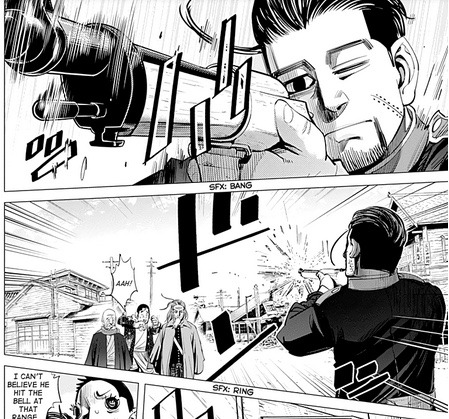
It is interesting that neither Hijikata or Nagakura appear concerned when he aims his rifle in their general direction but Shipei is shocked and scared holding up his arms to block and screams “aaah!”. The end result of the Barato arc is that Ogata was bold enough to acquire the skin and also offer his services to Hijikata, indicating that he would like a cut of the gold.
Ogata later determines how much Hijikata knows by floating what he knew from Tsurumi. I feel as though Ogata likely knew more than he mentioned here, but he needed to make sure he could get more information from Hijikata. It is very interesting that before beginning his line of questioning to Hijikata, he does his hair stroking habit, either to tell himself he can do this or to prepare himself to have this conversation perhaps. Or perhaps to look as confident as possible?

it is most interesting when he asks him if he feels sorry for the men who are following Hijikata, Hijikata never answers and it appears as though Ogata never turned took look at his face either. Ogata then asks Hijikata if Noppera-bou is an Ainu. This makes sense since Hijikata was in prison with him and was a key co-conspirator in the tattoo plan. This conversation ends with Hijikata stating that Noppera-bou is likely a Russian partisan and he has a partner on the outside, which allows for Noda-sensei to indicate that partner is Kiro.
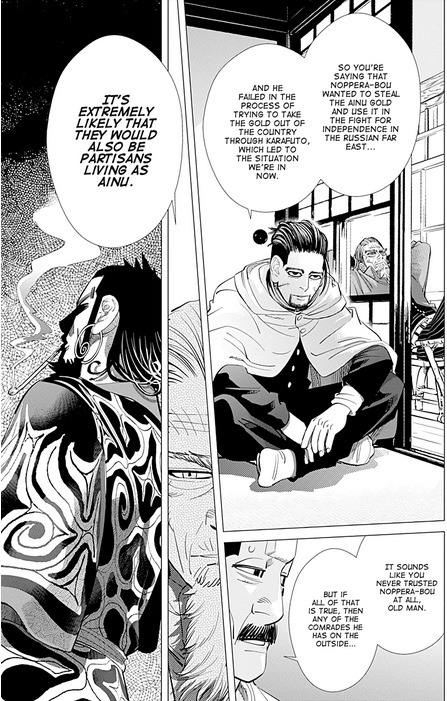
The question remains if Ogata already knew Kiro was an associate of Wilk’s or if he was working with him yet. But what is clear is that Ogata’s facial expression and the lack of an answer from Hijikata as to what his goals for the gold are, indicates that Ogata likely doesn’t share the same goal for the gold as Hijikata. I’ve wondered if his facial expression above is more of him realizing “Oh shit, this isn’t the person I want to work for to get the gold.”
Ogata clearly never saw him as working with Ushiyama as a team as indicated by the fact he tries to corner Edogai by himself (and almost succeeds). When Ogata comes up behind, Ushiyama has an annoyed expression on his face.
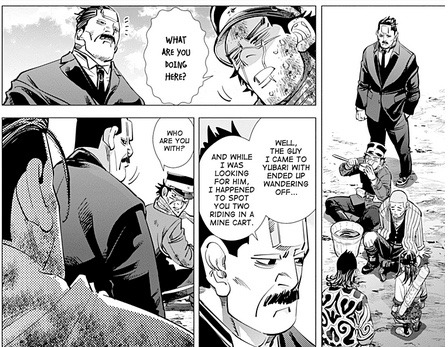
And based on how Ogata talks to Ushiyama on the next page here, he’s clearly the member of their non-team-team who is in charge. “We don’t have a much [of a] choice. . . bring them along”.
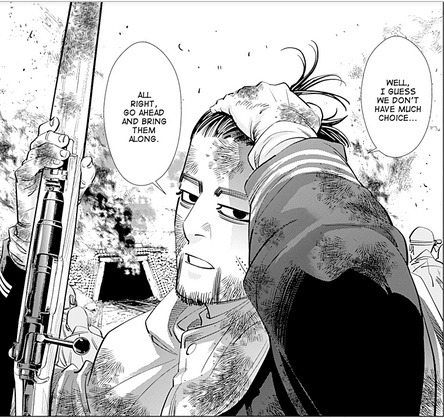
His body language seems to mirror his words with an incredibly assertive posture, fixing his messed up hair from the mine while showing off his rifle. I’d guess Ushiyama is about 25 or so years his senior but he’s taking full charge in this situation.
Once Sugimoto and Hijikata’s group combine over some horse nabe, Sugimoto immediately questions Ogata’s trustworthiness, knowing that he was the man from the 7th whom he had thought he had killed.
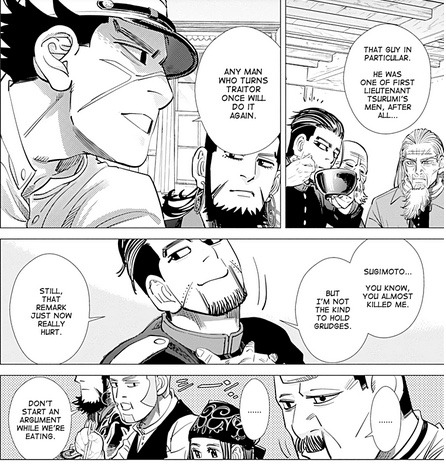
It is very interesting that when Sugimoto states that he will turn traitor once again, Kiro gives Sugimoto an odd side-eye glance. Ogata hams up his reply just to piss Sugimoto off, stating that he almost died by Sugimoto’s hands but he won’t hold a grudge but the remark about turning traitor hurt. At first, I thought he was being sarcastic, but now I think that remark did hurt Ogata since it becomes clear that most of the 27th didn’t respect him so even though he’s used to people insulting him, he likely does feel hurt since he may have had a small part of himself who wanted people to respect him and not trash talk him or disrespect him.
Interestingly, Shirashi tries to smooth things over, but that facial expression from Kiro in the background, he looks like he’s trying to hold something in that is in regards to Sugimoto and Ogata’s conversation. Does Kiro already know that he [Kiro himself] will turn traitor? Likely yes, since he has his own plans for the gold. Is he already working with Ogata? I’d love to know the answer to that.
What really doesn’t help Sugimoto-Ogata relations is quickly re-iterated by the attack by the 27th to destroy Edogai’s house. The former comrade is has got Ogata pinned as he tries to kill him in a rage state here. The man is done for, Ogata just bayoneted him and he’s got a gut wound so it is likely fatal.
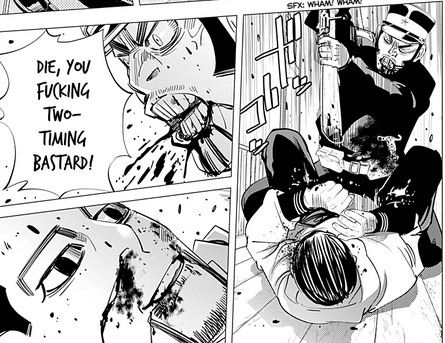
But since Ogata is not very good with hand to hand combat, Sugimoto comes in to save him. Even though the recent event have made it clear to the group that they are functioning as a team for the time being, Sugimoto wants to make it clear that Ogata is NOT a part of his group by repeating the words of the nameless man of the 27th.
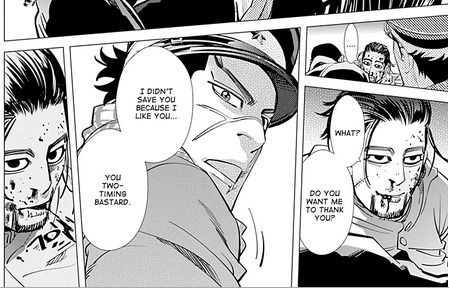
This is likely one of the worst things that Sugimoto could have said to Ogata. He has already said he doesn’t trust Ogata and now he’s using the words of a dying man to make it painfully clear that he does not trust Ogata. Sugimoto really goes by his emotions and this is a case where it clearly gets the best of him. But Hijikata forces Ogata into Sugimoto’s group and there wasn’t room for argument. By time he arrives all sweaty after providing sniper covering fire, he’s now a part of team Sugimoto-Asirpa 2.0.

He will then keep his distance from the group by refusing to eat brains as well as saying citatap; he only sees their group as a means to an end and he does not join the team. He is ignored during the silent kotan arc even though he backs up Asirpa’s strange behavior and does help out in the fight even though he doesn’t even bother with trying to impress Sugimoto with his trustworthiness despite saving Sugimoto’s life.
The group reforms to rescue Shirashi where after they escape with Shirashi from Asahikawa it breaks up and Ogata is now in Sugimoto-Asirpa 3.0 with Shirashi. Asirpa and Shirashi are interacting with Sugimoto while Ogata is crushing on the type 38 rifle by himself in a corner so to speak.

He again really doesn’t bond with the group, but assists when needed, shooting the deer on the mountain, carrying up the rear, and for the most part keeping quiet. He took Asirpa’s snake story seriously and unlike Shirashi and Sugimoto who really have bonded as friends, did not tease her (and get their deserved snake attack). As they make it to the swamp, he’s still unable to interact with Shirashi but does figure out Sugimoto’s motives as they eat the crane.
An indication that he at least might be a part of team Asirpa (but not Sugimoto-Asirpa 3.0) is when he rescues Tanigaki, despite how upset he is by Tanigaki’s presence. Perhaps, his fear of Tsurumi is misplaced but as would be indicated on the beach post locust swarm/otter nabe incident, he was able to figure out that Inkarmat was working with Tsurumi and in part used Tanigaki to get information on the group.
The most integrated that Ogata appears to be before reaching Abashiri is here. When he is a part of Asirpa’s nest of hungry chicks . . . Sugimoto is chewing his citatap, Ogata is being hand fed and a hungry Shirashi fidgets as he waits his turn.
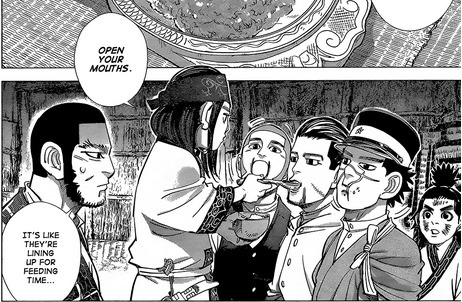
So only by Asirpa’s action does Ogata feel a connection to the greater group as a whole. Before Abashiri, he says citatap for Asirpa alone, perhaps out of respect to her and perhaps even to apologize to her what he is likely about to do when they infiltrate Abashiri to find Wilk.
After he shoots Wilk and Sugimoto, Ogata joins Kiro’s team. We still don’t know the full motivations for Ogata to move to Kiro’s group - as they travel through Karafuto, it becomes increasingly clear that Ogata and Kiro’s relationship/teamwork is not equal and Kiro is at the clear advantage. He has a plan which he only gives to Ogata and Shirashi on a need to know basis. As far as we know Ogata can only speak Japanese so his ability to interact with Russians or any of the native peoples is limited.
This is very clear based on their conversation at the fox farm.
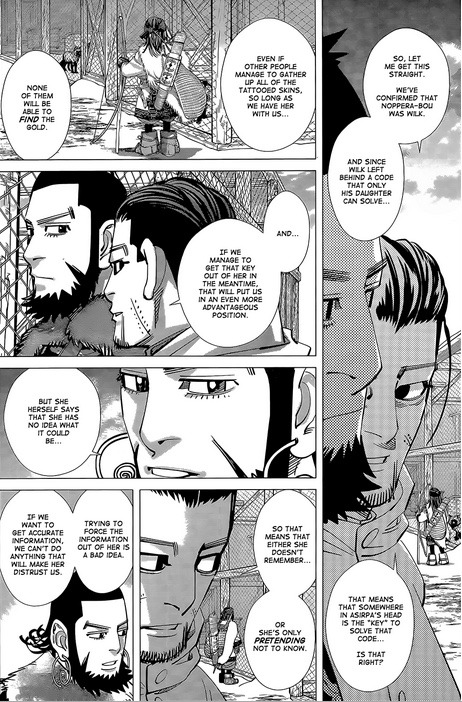
Ogata has no choice but to go along with Kiro for the time being, and he learns about Wilk, his past, his dreams and his methods to achieve them. Yes, Asirpa learns about her father more but Ogata learns more of the mindset that Wilk and Kiro have been living with for over 20 years. He learns how Kiro is the type of man who doesn’t have a problem having him kill his best friend who he loved. That he has no problem dragging Asirpa to Russia to learn more about her father and get her to give him the code to find the gold. That by likely bringing Asirpa along with him, she too will become a partisan like her father and she will have no choice but to join the cause and “lead her people”. She’s likely to be close to the age that Kiro was when he joined the group, he committed an act of terrorism by assassinating the czar when he was 15. All of this has informed Ogata that to Kiro the most important thing is the “cause” above all else. It doesn’t matter what the individual sacrifices are - it is the outcome that matters.
And the more he learns about the partisans the further he gets from Japan. Right now in the manga he’s with Asirpa on the ice flow trying to get her to tell him the code and he’s decided it is time to leave Kiro’s group as well.
Ogata tells Asirpa that he doesn’t want all of the gold and recognizes that having more than less of the gold would likely bring him misery and complications. This is likely true, he’s never been greedy from the get go.
What I find most interesting, is that if the reader follows Ogata’s experience between the groups, it isn’t that he is a traitor to any one group. The story has made it very clear that no group is united even if it appears to be united and everyone has his or her own motives and priorities and has been for the most part willing to sacrifice others to achieve them. Hijikata had no problem baiting Sugimoto and Shirashi so that he could find Wilk at Abarashi. Ogata’s movement between these different groups almost harks back to the fact that he was always looking for a mentor/father figure.
At some point in time, he had to have been loyal to Tsurumi, he wouldn’t have shot Yuusaku and many of us have read that he realized he was being used by Tsurumi after he assassinated Hanazawa. At that moment in the carriage Ogata realized that Tsurumi’s group wasn’t the right one for him.
He joined up with Tamai but unfortunately, Sugimoto via a bear takes out that trio.
After he successfully escapes from Tsurumi after his sniper battle with Tanigaki, he then joins Hijikata’s group. But based on his facial expressions and interactions with Hijikata, he knows this isn’t the type of leader he wants to work for either.
When he’s with Sugimoto and Asirpa, he is at the mercy of Sugimoto’s full wrath of emotions and slowly accepts kindness from Asirpa. His subtle mannerisms indicate he does appreciate Asirpa and does feel connected to her.
After the maneuvering after Abashiri he threw himself in with Kiro. As Kiro did not reveal most of his plan, Ogata has stated he had no choice but to go along with him until he knew what the best course of action would be. He’s now determined that Kiro is too dangerous and he has enough information about the partisans that he doesn’t want to get involved with them and doesn’t want Asirpa involved with them either. It is hard to tell what Ogata was expecting from Kiro, but since he has told Asirpa that he doesn’t trust him and that he’s dangerous he has come to the conclusion that Kiro’s group isn’t the right one for him either. All of their interactions have made it quite clear that Kiro was the leader and Ogata was support.
So now has Ogata decided to leave a group and strike out on his own with Asirpa? We can only see how this will unfold.
Ogata is in a unique space within the cast of gk; he has given the reader the observations of a man who is trying to figure out where he belongs and what group or leader he can best serve. So far, he’s not anywhere close to finding a group that he can belong to that treats him with dignity and respect. Nor is he any closer to finding a leader to inspire him to perform his duties (whatever they may be). He is a lost wildcat, but as indicated by his post-fever dream state and his encounter with his lynx sibling, he’s starting to find his own path. I wonder if Ogata will begin to serve as a devil’s advocate towards the others, really making them all question what are they doing in this crazy quest for the gold and are they working with the right people to advance themselves. it really would be an interesting angle, as he truly is the only character who has moved between so many groups in the series but with little connection to any of them.
This has turned out to be way longer than I originally intended, so my apologies.
#golden kamuy#gk meta#ogata hyakunosuke#asirpa#tsurumi tokushirou#sugimoto saichi#hijikata toshizo#kiroranke
49 notes
·
View notes
Note
You know Maisie not only said that Arya‘s gonna have completely different goals which she‘s never had before but we will also see a more fun and light Arya in s8 and that she got to do everything she‘s ever wanted for her. That must include a romance arc since she‘s always wanted that for her (specifically with Gendry lol). And Joe also mentioned that Arya is a young woman now. So I guess they‘re preparing us for a treat lmao.
im trying not speculate on what these two have to say bc i need to protect my heart lol but so far im getting a surprisingly decent vibe from maisie too. which is promising because she’s quick to put arya down. what the hell lets get into it. a little recap of maisie re: arya’s endgame and s8 promo:
“I know stuff now. And it’s not just knowing stuff, it’s knowing the end […] I hope in the new season I get a chance to bring back a bit more of that fun child we all fell in love with.” [x]
“I have an idea in my head of how this is gonna be and the arc that [Arya’s] gonna take and what her beginning, middle and end is. [x]
“I’ve always said I wanted her to find peace. The things that have been driving her through her story have been very bitter and twisted and aggressive. I would love for Arya to find her true self again and let go of this anger and revenge that’s accompanied her on this journey. I’d love for her to be happy. ” [x]
“I just want her to be happy and be safe and for someone to look out for her. She’s become so independent, and she’s got quite a hard-ass attitude. I think that it’d be nice to have peace of mind that she’s being protected by an elder. Not sure who that would be. But she’s had it rough, and it’d be nice for her to have a nice hunk. Can’t imagine that really happening—this is Game of Thrones—but in my world that’s what I would like for her. ” [x]
“Maisie said she got to do everything she ever wanted to do for Arya.” tweet also says the last scene she did was “fun” unclear to me if thats arya’s final scene or maisie’s [x]
“In this new season she has completely different goals, which she has never had before,” she says. [x]
she’s talked about wanting arya to be happy, to find peace, and a nice hunk for awhile. now she’s saying she got to do everything she ever wanted for arya in s8. that has dangerously good implications lol. im very pleased about the new goals thing (if i see one more fucking theory about arya killing cersei istg) we can assume that means less revenge. (she wont be able to kill beric or mel either imo) which we already saw the beginnings of in s7 with arya choosing wf and jon over kl and cersei. her reaction just hearing about jon instantly melted her into a soft little puddle of love. my gut feeling is that jon’s presence in arya’s life again will brighten her up even more. maybe gendry will have a role in that too. arya was heartbroken when he was taken. thats not even a dumb shipper exaggeration. like she was devastated, fought the brotherhood, confronted a witch, and added three (3) people to her list over that. so i think she’ll be happy to see him at least
as far as joe goes he’s been quick to shut arya/gendry down in the past but he ain’t doing that no more. he’s being evasive as fuck. like who does he think he’s fooling with this “oh idk what their reunion would be like!” shit literally the day after he wrapped for s8???? bitch you filmed it lol. but none of this is truly compelling to me in regards to a potential arya/gendry romance. im not ruling it out cause we know they own my ass. but im not sold either. i just cant get my hopes up based on some vague statements from a of couple professional liars.
weirdly enough the one thing i cannot shake is hot pie calling arya pretty. it was too random!!!!!!!!!!!! why was her physical attractiveness brought up for the very first time like that? idk tho. heres what i do know: their relationship in the show was always protective and sweet and trusting. arya was not only attracted to gendry but loved him. when she was still just a girl but now she’s a young woman as even joe pointed out. that could be game changing. she wanted him to be her family - an offer he turned down only because of his lowborn status which is becoming increasingly irrelevant as gendry discovered and embraces his royal blood. so the bottom line here is that literally nothing is keeping them from being together if they so wished. however im 99% sure gendry will be named lord of storms end (for the record: i firmly believe joe filmed in spain) but i have no clue what arya’s endgame will be. my only guess is winterfell’s resident executioner? but i would like to see something else. im just not sure what or how they’d fit together in the end.
the potential is all there and that makes this all the more frustrating. it could easily be done. they have the history. they have the chemistry. they have the bond. they have the support. they have each other. but i just dont know. and, ultimately, the show is complete trash so
my best case scenario for arya and gendry in s8 is still that they have a couple flirty interactions - not unlike what we’ve already seen between them (ie. “as m’lady commands” + arya checking him out) and like i keep saying the show is nothing but callbacks - with the implication they could be together in the future. thats as optimistic as i’ll go. i cannot bring myself to up the ante lmao.
#this is me using more words than necessary to say#idk and im scared to find out lol#galactic-eyed-dreamer#ask#got s8
14 notes
·
View notes
Text
ncfan listens to The Magnus Archives: S4 EP122, ‘Zombie’
Well, it turned out that I was wrong, and that the first episode of Season Four did not take place in medias res, though I still think the teaser with Martin they dropped on us took place before ‘Far Away.’ Anyways, we have another parallel for Jon, another warning about just how bad things can get if he doesn’t get a handle on himself, we have the messy and ambiguous question of just what is it that separates a human from a monster, and we get the news that unspecified Bad Shit went down in the Archives while Jon was in his supernatural coma.
Come hear my disorganized thoughts on The Magnus Archives!
- It would seem that Georgie did indeed recognize Oliver as an avatar of the End; I really do think this is a matter of like recognizing like. The fact that Basira didn’t press her further when Georgie replied to her “How do you automatically recognize an avatar of the End?” with “That’s really none of your business” is about the only moment we had with Basira that didn’t worry me on some level. That she didn’t follow up on this with demands for more information, badgering Georgie until she told her what she’d once told Jon, shows that she isn’t yet so deeply entangled with the Eye that she would feel compelled to follow that thread until she’d reached the source. But throughout the rest of the episode, Basira seems… I can’t tell what it is, if she just seems very disconnected from everything going on around her, or if she’s just on her guard with Jon, because she can’t yet tell if Jon still is Jon.
There’s apparently been a lot of bad stuff going on at the Archives in general while Jon was in a coma. Basira doesn’t seem to be doing so great herself.
- It’s unclear if Oliver brought the tape recorder Georgie found, or if it just materialized out of thin air. Given how increasingly overtly paranormal the tape recorders are, the latter explanation wouldn’t shock me.
- We’ll find out later that there’s something up with Melanie (same as there is with everyone, really), but that Basira intercepted Georgie’s attempts to make contact with Melanie, and seems to have refused Georgie access to her, suggests that there really is something seriously wrong with Melanie. Basira’s seemed protective of Melanie for a while, and I get the impression that she didn’t want to expose Melanie to anything that might… “destabilize” her. I worry that Melanie’s pre-existing pull towards the Slaughter might have intensified over the past six months: her anger feeding its hold over her, its hold over her feeding her anger, a vicious cycle that just goes on and on until she’s too constantly furiously angry and erratic to cope.
- …And they’ve found another tape recorder on the floor, possibly under the bed.
- Jon decides to let Georgie and Basira know he’s awake… by scaring the crap out of them. Or scaring the crap out of Basira and startling the crap out of Georgie, anyways. Oh, Jon.
- That Jon recovers so quickly from having been in a coma, “everything but brain dead” for six months really isn’t natural, and Georgie, at least, loathes the implications of it. So do I, to be honest. I knew Jon finding the impetus to wake up would come with a price, except the other shoe hasn’t dropped yet. Listen carefully in the episodes ahead, everyone.
- “Jon, is it still you?” That is the question of the century, isn’t it? Because Jon still sounds like himself, and you can make several different arguments for his lack of deep, emotional reactions to all the news he receives over the course of the episode. You can argue that he’s still very weak from having been in a coma for half a year and can’t dredge up emotions. You can argue that he gets hit with so much bad news at once that he just can’t process most of it, and the reason the only thing he really latches on to is what’s happening with Martin is because he actually has something resembling a concrete idea of the danger he’s in. You can argue that he just doesn’t want to run away with his emotions, since when he does that, bad things tend to happen.
But what gets me is his relative lack of reaction when Basira mentions Melanie being in a bad way. Unless I am very much mistaken, Jon freaked out when he first learned Melanie had been shot in India, and their only relationship back then was that of two people who occasionally met up to shout at each other. I’m worried that his knee-jerk protective reaction to the news that Peter Lukas is doing something with or to Martin was just due to the influence of the Beholding, making its avatar respond to a threat to another of its adherents.
And what else gets me is his apparent lack of concern for Basira herself. I do think there’s a chance that Basira is just refusing to drop her guard around Jon, since it’s at best highly unclear if he’s still himself and the monsters around these parts can seem very human, up until the moment when they open their mouth and let all their fangs show. But she spends the episode sounding very zoned out, very distant. To me, it sounds like the Beholding has definitely been having an effect on her, and Jon? Just doesn’t seem to care very much. And the worst part is, that can’t automatically be taken as a sign of Jon having changed, because Jon has always been the Asshole in Charge at the Magnus Institute. For as long as we’ve known him, he’s always been that guy who has a hard time understanding other people’s emotions and remembering why he should care about them. He was the guy who had no problem telling Naomi Herne to her face that she probably imagined everything that happened to her, the guy who had no problem constantly bad-mouthing Martin when he had to have known there was a chance Martin could listen to the tapes and hear him saying all this horrible shit, the guy who didn’t see anything wrong with stalking Tim, the guy who early on had no problem dismissing every last thing a statement-giver said as hallucinations or lies unless it was something related to his trauma. Jon’s always been a bit of a self-centered asshole, so him being a bit of a self-centered asshole now doesn’t necessarily indicate anything.
After finding out that Basira just happened to grab a statement on the way out the door of the Institute, after discovering that Jon’s first impulse upon waking up is to go ahead and feed the beast (I see that addiction is still running strong), and finding out that Jon no longer calls himself ‘Head Archivist of the Magnus Institute,’ but simply ‘The Archivist,’ all very reassuring signs (how long before Jon stops even sticking his name in before ‘The Archivist?’), we get into the statement.
- Lorell St. John provides us with another parallel and potential foil for Jonathan Sims. From the beginning, she is positioned as such, as a person who is disconnected from other people, has a hard time thinking about and visualizing their feelings, and is fond of animals. She’s someone who acts like other people don’t exist, or matter, which does sound a bit like Jon.
- There’s something St. John says about the difficulties of making sense of the world and the universe, saying that [paraphrased] “it’s all rubbish, people trying to think the universe into making sense,” feels like commentary on the Powers. Was it Jonny Sims who said that anyone who thinks they know what’s going on with the Powers is dead wrong?
- St. John is introduced by a friend (I entertained the possibility that Danielle was St. John’s girlfriend, but to be honest she sounds so disconnected that I can’t see her as being able to put in the work required to maintain a close relationship with anyone) to the concept of the “philosophical zombie.” The philosophical zombie is someone who appears outwardly human, but inside is empty; they have no inner life, they can’t feel anything, and any attempt to pretend otherwise is all just an act. It is, as Danielle says, just a thought experiment, but St. John becomes obsessed with the idea, and eventually becomes convinced that an increasingly large number of the people around her (by the time she gets to the Institute, it seems to have spread to everyone around her) is not a real person, but is in fact one of these zombies: an empty thing that apes humanity, but can only ever pretend to be a person.
Eventually, this delusion seems to have attracted the attention of one of the Powers, which sent an agent out to harass her. @centaurianthropology thinks it was the Spiral; myself, I’m torn between the Spiral and the Stranger. Visual and auditory hallucinations are definitely part of the Spiral’s purview, but to me, there’s the matter of St. John’s specific delusion, the thing that drew this agent to her. Her delusion was that the people around her weren’t actually people, but inhuman, uncanny things that pretended (in her opinion, badly) to be human. To me, that has the Stranger written all over it. I think what complicates it is that there is potential for the two Powers to bleed into each other when it comes to St. John’s delusion, so really, it could be either one. The fact that the agent doesn’t really do anything, just keeps repeating the same phrase over and over again, seems more indicative of the Spiral to me. I think an agent of the Stranger would have actually tried to do something to her.
(And personally, something about the agent, the changing colors of his shirt, I think, reminds me of the coffee billboard from ‘Fatigue,’ and that was definitely a Spiral statement.)
- The cruel experiments St. John carries out on her roommate whom she had become convinced is a zombie, slicing him with a knife and later killing his pet, which she feels no remorse for because she feels that he is not real, serves as a warning for Jon, of where he could end up if he doesn’t try to remain engaged with humanity, doesn’t keep reminding himself that other people do matter. I personally interpret it in a very particular way, based on my own experiences.
I am someone who does not have the easiest time interpreting my own emotions, let alone the emotions of others. I have thoughts, but I don’t automatically connect them with emotions. I have physical reactions, but I don’t automatically connect them with emotions. I have to work at figuring out and understanding what other people are feeling, and though I do try to figure it out, sometimes they’re just incomprehensible to me. As you might have gathered, I have issues with cognitive empathy.
St. John exhibits a lack of both empathy and sympathy with how she engages with the world, neither understanding people’s feelings nor caring about their feelings, and to me, the latter is a lot more inherently dangerous than the former. It’s one thing to not understand how other people feel, to have difficulty putting yourself in their shoes. It’s another thing to either be able to put yourself in someone else’s shoes with no difficulty, and decide that you just don’t care about their feelings, that their feelings don’t matter to you at all, for no other reason than because you can.
For Jon, there’s a lot more danger to not caring than not understanding. And I think he may be on the verge of falling down that rabbit hole now, and never coming out.
- When the question of what separates a human from a monster is raised, we aren’t given an answer—and to be honest, I’m not sure there’s any answer that can neatly delineate humans and monsters in a way that completely separates the two from each other. We hear of many people in the real world whom we consider monsters, but in the universe of The Magnus Archives, are completely human in makeup. You have people deeply entangled with the Powers showing signs of caring for others, to a certain extent. The child Agnes Montague saved a boy she barely knew from becoming a spider egg sac. Gertrude may have treated the people around her as pawns, to be used and discarded at will, but she cared enough about the world in a general sense to want to keep it from being warped and mutilated by the ascension of any one of the Powers, including the one she was tied to. We see Distortion-Helen grappling with feelings she doesn’t recognize as guilt. There is no one overwhelming criteria that makes someone human, or a monster. In a world where humans are capable of doing horrific things and monsters are capable of feeling guilt, you can’t point to any one thing as being the thing that absolutely 100% of the time separates them.
And I don’t think we have any real answer for the question of at what point a human is no longer a human, and has become completely monstrous. Because that is a completely internal measure, and none of us have a hotline into anyone’s minds but our own. I think that Jon is still recognizably human right now, but that he’s less human than he was before he left to stop the Unknowing. And I think that, if Jon is no longer human by the end of the series, if he has become completely monstrous, we’ll all be at a complete loss to pinpoint the exact moment that it happened. After all, at what point was Jane Prentiss no longer Jane Prentiss? Was it when the worms had eaten her eyes and her tongue and she could only see because of the Filth’s influence, only speak because of its influence? Was it when she thrust her arm into the wasp’s nest and the worms first burrowed into her flesh? Was it when she fell under the sway of their song? Or was it when she was a grade schooler, listening to one of her classmates talk about how a blackhead is a hole in your face that you have to keep clean, or else it will spread and your whole head will rot?
A final note in all of this: Jon’s voice becomes considerably stronger over the course of reading the statement. At the beginning, he’s hoarse and weak, but by the end, he sounds as if he was never in a coma at all. Just something to chew on.
- As I mentioned up above, we have it from Basira that Bad Shit has been going down at the Archives. It seems that having Peter Lukas in charge has not been good for the Institute or the people working in it, though we don’t have any specifics as of yet. Apparently Martin’s been engaging in off-the-books work with him, and again, no specifics, though I can’t imagine it’s anything good. The ‘Martin is a secret Lukas’ theory might be gaining increasing amounts of traction this season, might even be confirmed. Melanie’s not doing well. Tim is confirmed dead and people think Daisy is dead as well, though I personally think Basira might know more than she’s letting on as regards to Daisy, and doesn’t trust Jon with the information.
And something happened to the change of clothes Jon keeps in the Institute that rendered them unwearable. It’s been an action-packed six months. I personally wonder about that. There’s a lot of people in the supernatural community who’d have a lot of reason to have a grudge against the Magnus Institute. Learning that Elias is in prison and the Archivist who replaced Gertrude is out of commission might have made them decide the Institute was too vulnerable a target to be ignored. I suppose we’ll find out next week.
5 notes
·
View notes
Text
Theories about Rey and Kylo (spoilers ahead) and why they’re a sign Reylo is endgame
Below I want to explore two theories regarding aspects that are still considered “mysteries.”
I. Kylo Ren is stuck. He's still 23 years old due to his trauma.
Remember that interview with Adam where he admitted playing Kylo Ren younger than his age?
"I don't want to say how much younger, 'cause people will read into it. . . ." He flushes, and later says he regrets mentioning it at all. If it's a plot spoiler, it's unclear exactly how, unless it's related to his unexplained connection to Rey.
My take on that after watching Last Jedi is that Adam plays Kylo as the 23-year-old kid who never got over the treason of his Master and Uncle.
That isn’t far-fetched, considering after Force Awakens everyone mocked the character for his “childish,” unstable behaviour (Temper tantrums, “Crylo Ren, Emo Kylo” and so on).
Many will argue that at 23 you are an adult, but something that is increasingly striking as the story unfolds is how everyone around him seems to have infantilised Ben.
For instance, both Han and Luke refer to him as “a boy” to describe him the night he turned.
Han:
"He was training a new generation of Jedi. One boy, an apprentice turned against him, destroyed it all. Luke felt responsible… He walked away from everything."
Luke
It passed like a fleeting shadow and I was left with shame and consequence. And the last thing I saw were the eyes of a frightened boy whose Master had failed him."
Luke last words to him are so packed with implications they deserve a meta of their own, but it’s clear he still sees Ben as a boy.
"See you around, kid."
And his so-called master, Snoke? well, he isn’t much better at treating him like an adult:
“You have too much of your father’s heart in you,” snarls Snoke. “You’re no Vader. Alas, you’re just a child in a mask!”
Why does it matter from a Reylo perspective?
So, first of all, at the end of The Last Jedi all those men mentioned above, those father figures are gone. They can no longer infantilise and metaphorically castrate Ben. That’s no coincidence that in the same movie Snoke brags that he's the one responsible for the bond (Translate: ”You’re too stupid to talk to girls, so I had to do it for you”) and that Luke “cockblocked” him by barging inside the hut.
Now that he is his own master, he can start building his character; he doesn’t have to try and conform to the expectations of the men surrounding him.
Also, It’s important to notice that when Kylo/Ben is with Rey, he already metamorphoses into the “mature one,” until stress takes control and he starts putting his foot in his mouth. Around her, he’s shown composed, calm, he listens, doesn’t get angry, and he provides advice.
These are compelling arguments in favour of his redemption: Not only does he now possesses the means and tools to mature and heal, in Last Jedi he laid the foundations of a meaningful relationship with Rey because she trusts him and he’s there for her.
Conclusion: In IX, it's up to him now to not fuck up again.
II. Rey repressed the death of her parents and made up a story so she wouldn’t lose her mind, aka the “Orphan's Ordeal.”
Last Jedi is NOT a “direct continuation” of Force Awakens. By that, I don’t mean that TFA and TLJ aren’t linked obviously. What I mean is that Rian kept the themes that were important to him and ditched the “superfluous”, the “frivolous.”
Rey’s vision of the shuttle leaving Jakku was as “important” to him as the placement of the scar on Kylo’s face; J.J. placed it somewhere that looked goofy? No problem, Rian just moved it slightly, where it became suddenly more aesthetically pleasing. No biggie.
I’m of the opinion that the details do not matter, as long as we have the answer, and I was pleased to hear that Rey was a nobody.
But I can understand why some fans may be upset. So here is a theory that will help you bridge the gaps between what is shown in Rey’s vision in TFA and what Kylo saw in TLJ (if you need it).
There are countless of stories where orphans either turn out to be switched at birth, kidnapped by the bad guy or sent away by loving parents who were scared for their security. It’s a prevalent trope, and we all fell for it when Reymet BB-8.
Rey: Where do you come from?
[BB-8 beeps]
Rey: Classified, really? Me too. Big secret.
“Obviously”, that means she knows something! What a wonderful mystery to solve, isn't it?
*DING DING DING* WRONG!
Rey is resilient, tough, very clever and overall marvellous but she’s also lonely, scared, and she loves stories (She’s thirsty for any tales told around Niima, and that’s how she knows about “Han and Chewie, the smugglers.”)
A coping mechanism for orphans is to imagine that their parents are not dead or that they are some high profile spy/royalty/VIP who, one day, will come back to take them away from the pain.
So my theory is that Rey simply made up a story where the people who treated her poorly, sold her and that she buried in a pauper’s grave were not her "real" parents.
When Kylo pushes her to admit the truth, it’s because he SAW it. She knows the truth (Maz told her as much); she’s just unable to accept it. The pain is too sharp and that ties into why she started crying when in Force Awakens he mocked her humble origins.
The truth stings but now that the loth-cat is out of the bag, she can start to move on.
So here you go, this is the reason why we saw a shuttle in The Force Awakens, but her parents are dead and buried in The Last Jedi.
Why does it matter from a Reylo perspective?
Basically, for the same reasons as Ben's. Now that nothing ties her to the past, she can heal. And when it comes to engaging in a meaningful relationship, Last Jedi made sure to establish two things:
1. Rey is sexually attracted to Kylo (I mean, come on!)
2. She craves Ben's comforting presence.
Conclusion: Once she's ready to reconcile the two aspects of him, she'll be able to accept his engagement proposition.
Episode IX cannot come out soon enough to see how all of this is going to play.
320 notes
·
View notes
Photo
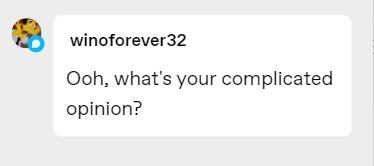
OMG, thank you for asking! I’ve been hinting about this in my tags for a while now and nobody’s ever asked, so I’ve been really debating about whether I should post this or not! (Although, to be fair, it was also because I knew this was going to be long, and I felt too lazy to type it all up.)
I just want to start by saying I cannot emphasize enough that I don’t want to take away from anyone’s love for the Captain! If you find him positive representation and relatable, then I support your happiness in this!
But, that being said, I think Them There/Six Idiots’s representation of gay and trans characters is not very good. I could bring in examples from their other works (i.e. Yonderland and Bill), but I’ll try to limit myself to the Captain.
I’ve seen people say things like, “It’s so great to see a gay man where his sexuality isn’t the joke!” But, it is the joke. It’s the whole joke! Okay, to be fair, it’s only half the joke, because the other half is how militaristic he is. But when the joke is about him being attracted to someone, the whole joke is that he’s gay! Take for example when he first sees Mike. Humor exists in the subversion of expectations. Thomas says, “Let me pluck out my eyes, for I shall never see such beauty again,” as the camera shows Alison. Then the Captain says, “Yes.” There’s a pause, where the audience assumes he’s also talking about Alison. But then he adds, “He’d make a very fine soldier,” and we laugh because our heteronormative expectations have been subverted. The Captain is gay. That’s what’s funny! The Captain then clears his throat. We understand that he’s not out and proud. He’s not unashamed of his lust, the way Thomas and Kitty are. The facade of a straight man is maintained, allowing the show to continue to exploit the gap between the behavior expected of a straight man and the Captain’s behavior for laughs. If the joke goes beyond his being gay, it’s that he’s gay and closeted.
Now, you could argue that that wasn’t the joke, that the joke was that he was so invested in his military lifestyle that he conflated it with his sexuality. In other words, the joke was that he was attracted to soldiers, not all men. But that’s not the case at all, because no other case of him combining his fascination with war with attraction to anybody is ever shown. Additionally, because of the heteronormative bias we’re all immersed in every day (not to mention the very real behavior of military recruiters and real-life soldiers), we just more firmly expect a person with an unspecified sexuality to be straight than we do for an army captain to not look at the world and every person in it through a military lens. In other words, there’s more of a gap between our expectations of his sexuality and its subversion than there is between our expectations of appropriate behavior for an army captain and its subversion to exploit. Therefore, even though both his being attracted to a man and the reason why/the way he chooses to express that attraction are humorous, the bulk of our laugh comes from the realization of his sexuality. In order to exploit his expression of his lust in the form of military recruitment for laughs, the writers would have needed to remove the question of his sexuality from the joke altogether. To do this, they would have had to establish his sexuality explicitly and unambiguously before this scene. They did not do that.
You could then argue that that was the first joke, and it established his sexuality, and none of the jokes about his attraction afterwards exploited that expectation. But, as I said above, they still did not make his sexuality explicit. He pretends to be straight, and so we expect him to act straight. That’s as good as actually expecting him to be straight before the first joke for the purposes of laughs. Either way, we expect him to act straight, and so when he acts gay, he subverts our expectations and makes us laugh. Again, the whole joke is that he’s gay.
I’d like to turn now to the way his sexuality is treated in the serious parts, how it’s treated outside of the jokes. I do want to add the caveat here that I don’t find this show emotionally compelling at all, the way a lot of people do. So I am coming at it from that point of view.
After the first season, I said I would be more okay with them exploiting the Captain’s being closeted for laughs if they actually seriously addressed what it’s like to be a closeted gay man. For the record, I know Ben Willbond said in at least one interview that he didn’t want to “ge[t] too deep about it because it is just a comedy.” Personally, I don’t agree with that point of view. I believe that if you’re going to deal with a socially sensitive issue in a comedy, you should give the weight it deserves. I don’t believe everything in a comedy has to be for laughs. Perhaps if you find the Captain emotionally compelling, you would disagree with me that his experience with his sexuality needs to be treated earnestly (and you probably agree with me that not everything in a comedy has to be for laughs). I can respect that opinion, but I’m afraid I do not share it. I would have liked to have seen an explicit depiction of his experience and struggles with his sexuality.
Which brings me, of course, to Redding Weddy. Frankly, I think the Captain throughout the entire show is barely one step away from queerbaiting. Yes, at least there’s never any hint of his actually being heterosexual. That’s a slight improvement from most queerbaiting. But they still never make his sexuality explicit. To my knowledge, none of Them There have even said the words “gay” or “homosexual” in an interview in relation to the Captain. It’s an unspoken understanding between the show and the audience, and that leaves the character open to interpretation. There are allegedly fans out there who still do not believe the Captain is gay. And to my mind, Redding Weddy just gives those fans ammunition.
Redding Weddy is ambiguous. The Captain is clearly as horny as a goat for his lieutenant. But at the same time, even then, even in a flashback, even when the Captain is alone with the audience, we get no explicit confirmation of his sexuality. The Captain’s explanation of Operation William is unclear. It could be taken at face value. In that case, the Captain never wrote a letter to Havers, he really did just bury blueprints with the mine, and all the hinting that he was in love with Havers was just misdirection. At best, we can believe that both were true: that the Captain was in love with Havers, and the misdirection was in the story’s focus on his feelings to distract the audience from the fact that he was really buying secret blueprints. At worst, the whole thing was a misdirection, and he was never in love with Havers at all. I don’t believe that, but it is a perfectly reasonable interpretation. It could also be that the Captain was lying about the blueprints. In that case, he really did write a love letter to Havers and hide it with the mine, only concocting the story about the blueprints and the whole operation being called “Operation William” at the last minute when he needed to explain the mine to Alison. That makes less sense to me, because why would he need to mention the paper and the name William at all, now that it had been blown up? However, you could still explain that away by him being afraid that the letter survived and trying to pre-empt any questions, should the letter ever be found. That’s a bit too much of a stretch in my opinion, but still not a totally unreasonable explanation. I think it’s significant that none of the other ghosts weighed in on the story, even though at least one or two of them must have seen or heard something. I think the story was kept deliberately ambiguous in order to keep the Captain’s very obvious sexuality as vague as was still possible. I don’t like that.
What I would have liked to have seen, more than anything else in regards to the Captain, is for them to have treated his sexuality the same way they treated Kitty’s race: as completely inconsequential. I’m not good enough with history to know exactly when Kitty lived and died, but she’s supposed to be a noble, or at least rich, Georgian woman, right? Google tells me that slavery was not abolished in the British Empire until 1833, under the reign of William IV (who, as I know we all remember from The Monarchs Song, came after George IV). Would a black woman have been granted dignity and respect in the heart of an empire built by the labor of people enslaved with no justification other than the color of their skin? If I’m wrong, please correct me, but I don’t expect so.
I do understand the need for both types of stories. I understand that there’s value in stories about a person of color, or a woman, or a member of any other minority or disadvantaged group fighting for equality and gaining ground. It’s good to have stories that explicitly support equality. But it is my opinion that there’s also value in simply presenting that equality, as unrealistic as it might now seem. It normalizes that equality, and it lets people who identify with one of the disadvantaged groups feel included. That’s why I love seeing a black woman being a Georgian noblewoman, because why shouldn't black people be able to dream of belonging to any period of British history that they want to? None of us can time travel, so it’s no more unrealistic for a black person to dream that than a white person. And that’s why I would have liked to have seen the same thing with the Captain. No, of course homosexuality was not accepted in the 40′s. But why shouldn’t we be able to pretend that it was? Why can’t we just see a gay man being treated completely equally to everyone else, irrespective of his sexuality? Why can’t we let gay men and maybe even others who identify as anything other than cis and straight dream of being able to be themselves in any historical era that they want to? That’s why I would very much have preferred if the Captain was just out, that they used a word like “gay” or “homosexual” on the show in reference to him, and if the whole joke of his character was just his military ways. Possibly mixed with how horny he is, just like Thomas or Kitty. But, in that case, as with Kitty and Thomas, the joke would not have been that he was gay, it would have just been that he wanted carnal satisfaction when he had no physical form. That would have been much better representation in my opinion.
This has all be in answer to the question above, posed on my post about how the Captain dancing with a gay couple at the end of season 2 was magical. I stand by that. I want the Captain to be out and happy, and him indulging himself and being comfortable with his sexuality makes me happy. But the fact that his sexual orientation is so often the butt of jokes, that they never address his struggles about getting comfortable with himself, and that they never dignify him by saying his sexuality out loud makes me feel frustrated and disappointed.
#winoforever32#Gosh sorry I'm sure you weren't expecting an essay!#If you or no one else reads this I don't blame anyone! Yikes...#Ghosts#BBC Ghosts#opinion#original
0 notes
Text
Influence-The Psychology of Persuasion
by Dr. Robert Cialdini
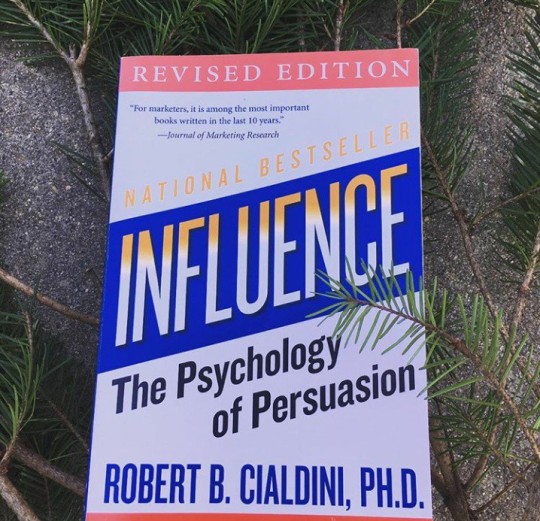
What are the factors that cause one person to say yes to another person and which techniques are used to bring about such compliance?
Why it is that a request stated in a certain way will be rejected, while a request that asks for the same favor in a slightly different fashion will be successful?
These are questions asked and explained in Robert Cialdini’s book “Influence”.
Lesson 1: Contrast
Today’s works moves at a fast pace. We need to absorb, process and act on information constantly. When we need to make a decision, we often resort to using shortcuts in the decision making process. One such shortcut is the contrast principle.
The contrast principle affects the way we see the difference between two things that are presented one after another. Simply put, if the second item is fairly different from the first, we will tend to see it as more different than it actually is.
This “weapon of influence” as Cialdini calls them does not go unexploited and its greatest advantage is not only that it works but also that it is virtually undetectable.
Have you ever been shopping for clothes, selected a fairly expensive suit or dress and then been persuaded to accessorise with a shirt, shoes or bag? I have – at least with the suit, shirt and shoes! That’s the contrast principle in action.
It is much more profitable for the salesperson to present the expensive item first, not only because to fail to do so will lose the influence of the contrast principle; to fail to do so will also cause the principle to work actively against them. If we the first thing we buy is comparably cheap the more expensive seems – more expensive.
Do you want fries with that?
Lesson 2: Reciprocation
The second of Cialdini’s weapons of influence is the rule of reciprocation. The rule says that we should try to repay, in kind, what another person has provided us.
A large number if not all of us have been taught to live up to the rule, and know about the social sanctions and derision applied to anyone who violates it - moochers, freeloaders, spongers.
Because there is general distaste for those who take and make no effort to give in return, we will often go to great lengths to avoid being considered one of their number.
Cialdini suggests , one of the reasons reciprocation can be used so effectively as a device for gaining another’s compliance is its power. The rule possesses awesome strength, often producing a “yes” response to a request that, except for an existing feeling of indebtedness, would have surely been refused.
As a marketing technique, the free sample engages the reciprocity rule. The promoter who gives free samples can release the natural indebting force inherent in a gift while innocently appearing to have only the intention to inform.
A person can trigger a feeling of indebtedness by doing an uninvited favor. The rule only states that we should provide to others the kind of actions they have provided us; it does not require us to have asked for what we have received in order to feel obligated to repay.
Most of us find it highly disagreeable to be in a state of obligation. It weighs heavily on us and demands to be removed.
Consequently, we may be willing to agree to perform a larger favor than we received, merely to relieve ourselves of the psychological burden of debt.
There’s no such thing as a free lunch.
Lesson 3: Top Lining
Cialdini’s third weapon of influence is the top lining technique.
This is easy to state: first make a larger request of me, one that I will most likely turn down. Then, after I have refused, make the smaller request that you were really interested in all along. Most likely I’ll oblige.
Here is a commercial example. You go to buy a new Laptop. The sales assistant, Bob, invariably shows you the deluxe model first. If you buy, great for Bob. He’s just made a bigger margin. However, you’re likely to decline – after all you don’t need the bells and whistles. Bob counters with a more reasonably priced model. You’re hooked, you buy. Bob wins again, after all a sale is a sale.
This technique happens all the time in retail. Tomorrow, count the rejection and retreat offers you encounter. I expect there are more than a handful.
Lesson 4: Consistency
Cialdini tells us something fascinating about people at the racetrack: Just after placing a bet, they are much more confident of their horse’s chances of winning than they are immediately before laying down that bet. Of course, nothing about the horse’s chances actually shifts; it’s the same horse, on the same track, in the same field; but in the minds of those bettors, its prospects improve significantly once that ticket is purchased.
This is Cialdini’s fourth weapon of influence: The force of consistency.
Quite simply, once we have made a choice or taken a stand, we encounter pressures to behave consistently with that commitment. We fool ourselves to keep our thoughts and beliefs consistent with what we have already decided.
But because it is in our best interests to be consistent, such consistency can also be exploited by those who would prefer that we don’t think too much in response to their requests for our compliance.
Take toy manufacturers wanting to increase sales in January or February.
They start prior to Christmas with attractive TV ads for certain special toys. The kids, naturally, want what they see and extract Christmas promises for these items from their parents. The manufacturers undersupply the stores with the toys they’ve gotten the parents to promise. Most are forced to substitute other toys of equal value.
The toy manufacturers, of course, make a point of supplying the stores with plenty of these substitutes. Then, after Christmas, the companies start running the ads again for the other, special toys which are now in great supply and as a parent we need to be consistent to our promise and hey presto. Double toys, double expense.
Lesson 5: Compliance
“How are you doing today?” The caller’s intent seem to be friendly and caring. But it has a cutting edge. There is a sales pitch approaching. The theory behind this tactic is that people who have just asserted that they are doing fine—even as a routine part of a sociable exchange—will consequently find it awkward to appear stingy in the context of their own admittedly favored circumstances.
You’ve fallen into the compliance trap.
Cialdini tells us to be very careful about agreeing to trivial requests. Such agreements not only increase our compliance with similar, larger requests, it can also make us more willing to perform a variety of larger favors that are only remotely connected to the little one we did earlier.
Whenever you take a stand that is visible to others, you are driven to maintain that stand to look like a consistent person. Commitments are most effective when they are active, public, and effortful.
So how are you doing?
Lesson 6: Social Proof
Like Seinfeld? Ever join in the laughter while on your own? To discover why canned laughter is so effective, we first need to understand the nature of yet another of Cialdini’s weapons of influence: the principle of social proof.
The principle applies to the way we decide what constitutes correct behavior. We view a behavior as more correct in a given situation to the extent that we see others performing it.
Advertisers love to inform us when a product is the “fastest-growing” or “largest-selling” because they don’t have to convince us directly that the product is good, they need only say that many others think so, which seems proof enough to us.
In general, when we are unsure of ourselves, when the situation is unclear or ambiguous, when uncertainty reigns, we are most likely to look to and accept the actions of others as correct a phenomenon called “pluralistic ignorance.”
We will use the actions of others to decide on proper behavior for ourselves, especially when we view those others as similar to ourselves.
We like people who are similar to us. This fact seems to hold true whether the similarity is in the area of opinions, personality traits, background, or life-style. Consequently, those who wish to be liked in order to increase our compliance can accomplish that purpose by appearing similar to us in any of a wide variety of ways. Which leads nicely onto the next lesson
Lesson 7: Liking
An important fact about human nature: We are phenomenal suckers for flattery. Although there are limits to our gullibility��especially when we can be sure that the flatterer is trying to manipulate us—we tend, as a rule, to believe praise and to like those who provide it, oftentimes when it is clearly false. Liking: Cialdini’s next weapon of influence. A host of examples is possible. Most are familiar, like the new-car salesman who takes our side and “does battle” with his boss to secure us a good deal. In Olympiad years, we are told precisely which is the “official” hair spray and facial tissue of our Olympic teams. The linking of celebrities to products is another way advertisers cash in on the association principle. Professional athletes are paid to connect themselves to things that can be directly relevant to their roles (sport shoes, tennis rackets, golf balls) or wholly irrelevant (soft drinks, popcorn poppers, even after shave).
Lesson 8: Scarcity
The scarcity principle: opportunities seem more valuable to us when their availability is limited.
Whilst in conversation we are routinely interrupted to answer the ring of our cell phone. And we answer rather than continue talking. In such a situation, the caller has a compelling feature that our face-to-face partner does not: potential unavailability. If we don’t take the call, we might miss it (and the information it carries) for good.
Cialdini suggests people seem to be more motivated by the thought of losing something than by the thought of gaining something of equal value. For instance, homeowners told how much money they could lose from inadequate insulation are more likely to insulate their homes than those told how much money they could save.
As a rule, if it is rare or becoming rare, it is more valuable.
A variant of the deadline tactic, much favored by some face-to-face, high-pressure sellers, carries the purest form of decision deadline: right now. Customers are often told that unless they make an immediate decision to buy, they will have to purchase the item at a higher price or they will be unable to purchase it at all.
Incidently, scarcity is a also a primary cause of political turmoil and violence.
Revolutionaries are more likely to be those who have been given at least some taste of a better life. When the economic and social improvements they have experienced and come to expect suddenly become less available, they desire them more than ever and often rise up violently to secure them.
When it comes to freedoms, it is more dangerous to have given for a while than never to have given at all. So remember once delivered you can’t take it away.
0 notes
Photo

THE HI-TOUCH
I like to joke that on February 14, 2020, I met the love of my life.
I didn’t, of course. But for a second, I fumbled my way through a half-high-five-half-handhold with the K-pop boy group Monsta X and absolutely did not cry, no matter what Rolling Stone attempted to imply. (Yes, that’s me in the foreground of the final photograph.)
The hi-touch is an extremely weird event, to say the least.

Anxious because this was the first time I’d ever attended a fan event, I’d managed to show up four hours early. About three of these hours were spent nervously reading Orfeo by Richard Powers at the Coffee Bean down the street, occasionally looking over trying to figure out when people queue up.
The final hour was actually spent in the line. I tried to make small-talk with the fan in front of me, but soon gave that up when she grimaced in disapproval after finding out I’d been a fan for “only a month” then literally took me by the shoulders and shook me while insisting, “MAKE SURE YOU MAKE EYE CONTACT WITH THEM! MAKE EYE CONTACT OR YOU’LL REGRET IT!”
It was while I was worriedly scrolling through my phone that Monsta X rolled in in sports cars.
Just as I began to recover from the absolutely mind-boggling spectacles I’d already been forced to face, I was ushered into the venue--which housed six enormous cut-outs of the members’ faces. Which, frankly, was terrifying.

(Photo: Michelle Kim. Two of the “six enormous cut-outs,” featuring Hyungwon and Joohoney, set-up at Tower Records for Monsta X’s meet-and-greet on Feb. 14, 2020.)
I’d probably been waiting in there for around 15 minutes when the employees desperately trying to hype up the room (mostly full of nervous young girls) introduced Monsta X, who suddenly burst through the curtains on the opposite side of the room and rushed up to the table before hurriedly taking their seats (Kihyun, their main vocalist, barely had time to shrug off his jacket) and sticking out their hands.
After that, it’s just a blur.
Writing this approximately a month after the event, all I can remember is the first member possibly smirking at me, the second holding my hand more firmly than I’d expected, the third smiling broadly, and the last two seeming tired.
And then I stumbled out of the venue and called an Uber and was back home, largely unchanged.

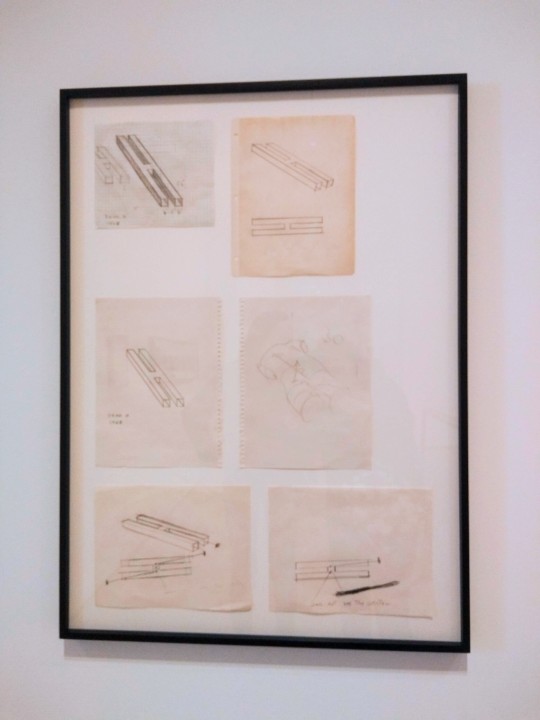
(Photo: Michelle Kim. Paul McCarthy, Dead H Drawings, 1968-69; graphite and ink on paper. Paul McCarthy, Dead H Crooked Leg, 1979 and Dead H Crooked Leg Maze, 1979; graphite and ink on paper. On display at the Hammer Museum in Los Angeles, CA. Photo taken Feb. 22, 2020.)
The Gaze
When recalling the original myth of Orpheus and Eurydice, the first thing that usually comes to my mind is Orpheus turning around to look at Eurydice and to lose her. It’s the climax of the story. And though that Orphic gaze is translated differently in different iterations of the myth, it always seems to be a focal point.
Gazing at something implies a strange binary--it reveals that there is that which you can see and that which you cannot. Paul McCarthy captures this in his Dead H Drawings, a series of sketches of said letter with the space in the center horizontal line highlighted. If you were to look through the legs, you would never be able to see the inside of that portion; you could only see out the other end of the leg like a tunnel. Hence, it’s a dead space.
Even when just looking at a specific object, it becomes clear that you can only focus on one thing at a time. Everything in your peripheral is less easily accessed--forget whatever’s happening behind you.
In Orpheus’s case, the gaze is about confirming Eurydice’s presence yet also losing her. It’s both a moment of relief and of grief, of catharsis and of catastrophe. The nature of his tragedy is that he can’t have the first without the second; if he did, he will have succeeded.
For Scottie, the protagonist of Hitchcock’s Vertigo, it’s exactly this sense of conflicted intangibility that attracts him to Judy/Madeleine, the Eurydice-figure. Even when he believes she’s just Madeleine, there’s an element of fantastical unreachability to her--the fact that she is supposedly possessed by Carlotta. And then when Judy falls back into the Madeleine role, Scottie continues to push her to the edge until she dies a true and final death.
Perhaps this is what makes celebrities such easy objects of affection and what motivates paparazzi. Celebrity sightings, celebrity photos, and two-minute interviews--they’re all small glimpses of a desirable person that we wouldn’t otherwise be able to access.

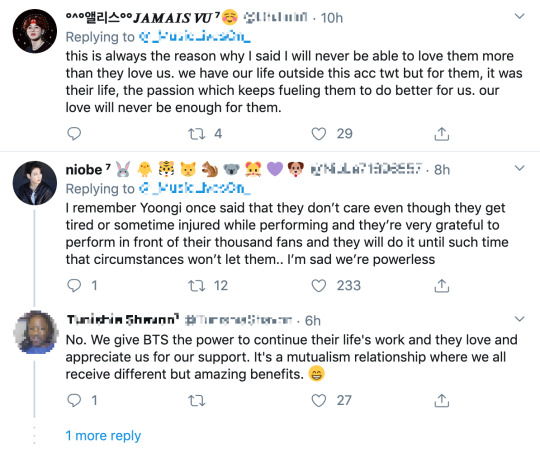
(Screenshots of replies from Twitter on a tweet regarding how the original poster believes BTS loves ARMY more than ARMY could ever love them, taken on March 11, 2020. Twitter handles and personal information have been blurred for the users’ privacy.)
A persistent phenomenon in BTS’s fanbase is ARMY seeming to think that BTS’s members genuinely love all of their fans.
K-pop is particularly adept when it comes to commodifying celebrities. It’s why they’re referred to as “idols” and not just as normal performers. Their jobs are to record songs and dance at concerts, but they’re also expected to vlog, feature on variety and reality shows, film practice videos, take and post selfies, consistently interact with fans on Fancafe (a blog platform for K-pop idols), be gracious and friendly in public--and on top of all this pressure, maintain their appearances and memorize choreography and lyrics.
Because there’s hundreds of hours of content featuring them available, it’s easy for fans to believe that they truly, personally understand their favorite idols. But idols are first and foremost entertainers. Everything they do is in the interest of gaining more fans, who turn into consumers and therefore income. When taking into account their motivation, does that still make idols genuine?
In Sarah Ruhl’s play Eurydice, Eurydice loses her memory upon death. She must relearn who she was when she was alive through her father, also dead, as he reteaches her how to read, her favorite past-time when alive.
By the time Orpheus arrives to guide her out of the Underworld, it’s unclear if Eurydice has regained her previous sense of self. And if she has, it’s been filtered through her father.
Similarly, the return of “Madeleine” in Hitchcock’s Vertigo is a hazy recollection of the original woman.

(Vertigo (1958) dir. Alfred Hitchcock.)
Though Judy is dressed as Madeleine, talks like Madeleine, and walks like Madeleine, she’s only playing the Madeleine that Scottie wants to see. She’s putting on an artificial performance of what he expects in an effort to appease him. The Madeleine that he wants is a cool, refined, and feminine lady. Though not playing hard-to-get, she’s always out of reach as a woman both disconnected from reality and married, therefore unavailable.
Judy can’t always be that. In the car, when Scottie drives her to the bell tower where the true Madeline died, Judy slips through her Madeleine veneer as she acts just a shade too coy.
Eurydice can’t always be what Orpheus expects her to be. The Backwards Look that ultimately causes him to lose her is an act of attempted confirmation, to be sure that he has her: the “loan” that Hades had promised him.
This Backwards Look manifests in many ways among BTS fans.
First, there are the sasaengs and fansites. They’re in some ways comparable to paparazzi--fansites especially, who consider it their (unpaid and unasked for) jobs to photograph idols at their every public appearance, even if they’re just going to catch a flight, then to share their professional-grade photographs online. Sasaengs take this a step further; they’re essentially stalkers who will buy an idol’s personal information to, for example, share a flight and book a neighboring hotel room to be as physically close to them as possible.
Though less extreme, there are also fan artists and fanfiction writers. Both attempt to capture the BTS members’ personalities and internal lives and manifest them in portraits, comics, and elaborate stories (often novel-length or longer). Artists and writers have to assume something about BTS when creating such content. There’s no way anyone could fully understand what’s happening in another person’s head. And when BTS is constantly presenting stage personas while acting like reality shows, filmed by dozens of cameras and producers, represent who they truly are, it’s difficult to say who the artists and writers are trying to capture.
Even a fan’s desire to stream music and videos and look at photos of BTS is a form of the Backwards Look. They’re constantly revisiting a moment and trying to recapture that first instance of experiencing it. This is the Eurydice moment--the experience of falling in love with a piece of art in a brief glance, and losing that feeling as soon as the moment is over.
These experiences are by no means limited to just BTS. Many fandoms, especially other K-pop groups’ fandoms, all experience this overwhelming amount of content consumption. But because BTS is the current Orpheus--dominating their music genre--they have the most fans, the most fanart and fanfiction, and the most streams. They are constantly under the pressure of the Backwards Gaze.
And they are constantly beyond it at the same time. In Ovid’s telling, Eurydice disappears as soon as Orpheus looks back (“she was gone, in a moment”). In Ruhl’s, the lovers “turn away from each other, matter-of-fact, compelled” as soon Orpheus sees Eurydice. When Scottie finally sees the Madeleine he wants, she dies in the next scene.
Eurydice is always beyond reach. And for every minute of content BTS releases, there’s still hours where they’re beyond the camera’s gaze. Are they the same in front of it as they are apart from it? Would they still profess how much they love ARMY if no one was there to record them? Would RM be as well-spoken? Would Jin’s laugh be the same?

It’s only been a month or so, but it’s difficult for me to recall what exactly happened when I gave Shownu, the leader of Monsta X, a horrifically awkward half-high-five-half-handshake. I tried to record what happened right after the event, but I was so shocked that all I could write for him was “funny little smile,” which doesn’t help much when I’m trying to piece together the memory.
Even in the moment, it was difficult to parse exactly what that “funny little smile” meant. There’s only so much time to think when you’re given just a split-second glance. Had Shownu been teasing, playing the flirt that loves all his fans as idols are expected to? Had he been genuinely excited to be there? Had he been embarrassed? (I know I was.) Maybe the smile hadn’t been funny, or little, or even a smile at all--maybe I’d read the moment all wrong.
Funnily enough, Shownu features on a song called, “Don’t Look Back.”

[« prev] · [next »]
0 notes
Text
Game of Thrones 7x07: Look What You Made Me Do

And just like that it's over! This truncated season of seven episodes blew by as fast as a trip from Dragonstone to Eastwatch. I'm still not really sure why this season had to BE only seven episodes, I know the show is intensely expensive, but HBO has the money and why not shell out for three more episodes of their most popular property? Now faced with the prospect of a final season not hitting our little screens until 2019, I feel like a six episode finale is just not gonna cut it. I mean are we even going to make it two more years as a society? I would be super bummed if I had to leave this physical plane without having heard the final chords of the song of ice and fire. Although if the producers want to take the time to think very hard about writing and storytelling, I would not be adverse to that. Let's be real, while this season was full of spectacle, and had plenty to enjoy, the writing was just not up to the par of previous years. Drama that felt natural and earned was shelved in order to rush forward big "show stopping" moments such as Dany and Jon's meeting, ice dragon making, and this past episode's all hands on deck summit in the dragon pit.
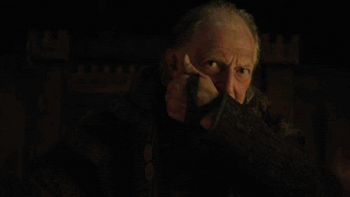
Fan theories spiraled wildly out of control in correspondence with the increasingly erratic storytelling on screen. Instead of trying to predict the solution to a complex puzzle-plot, we are now in a time when literally anything can happen, including (but not limited to) Lannister lieutenant Ed Sheeran. Still, were we not entertained? There were absolutely moments this season that will go into the annals of GOT greatness: Arya's Walder Frey Face Swap Massacre, Olenna Tyrell's Final Fuck Off, Loot Train Battle Dragon Destructo-Fest 2k17 to name a few. But the season's writing on a whole often veered into what felt like fan service (or straight up fanfiction). Game of Thrones isn't the first show to do this, but it is the first show to do it that up until this point has been famous for granting essentially the opposite of fan service. Oh you love this strong, glorious, perhaps ridiculously attractive, character? It would be a shame if something were to....happen...to them. But that being said this episode felt a bit more solid than it's immediate predecessor, and while they may not have completely stuck the landing, it was more of a point deduction for some hops rather than a horrifying leg break (did anyone else see that last Olympics? There is not a day that goes by I don't think about it.)

So our merry band of zombie hunters, as well as Brienne and Pod, have all assembled at King's Landing in order to persuade Cersei into a ceasefire. How much time has passed since the zombie capture? Days, weeks? Who knows. What's important is all of our favorites have assembled in a veritable class reunion. Pod is happy to see his old boss Tyrion still in one piece, Bronn is reunited with Pod, and Brienne and The Hound are downright chummy despite Brienne being under the impression she had murdered him during their previous encounter. Time really does heal all. But how much time? That's the true question. For once Jon is not the most popular princess at the party, he didn't fight in the Battle of the Blackwater, and he didn't co-parent a murderous pre-teen. Our group is escorted to the not-at-all-a-trap Dragon Pits where they await Cersei. Bronn and Pod peace out immediately because Bronn don't give a shit and also can't contractually be in the same room as Lena Headey. Ain't love grand.

Cersei is rolling deep (her crew includes Euron thank god), but her entrance is promptly upstaged by Dany flying in on Drogon. Before anything can happen, Euron interrupts the proceedings to call out Theon for, essentially, being a little bitch. It is glorious. Anyway the zombie is produced and runs right at Cersei, where exactly none of the people sworn to protect her do a single goddamn thing. Euron weighs the threat of millions of the undead versus the safety of his little island and peaces HARD. I absolutely loved this reaction and wish it had been genuine. Is Euron my favorite character? Unclear, but strong maybe. Cersei says she will stand down if Jon promises to stay neutral. Jon I Can-Not-Tell-A-Lie Snow/Targaryen of course blabs that he already bent the knee to Dany. No one is impressed by this. Not only is Jon the least popular, he is now also the least liked.

Brienne cements my theory she only made the trip to tje Landing o'Kings to act as Jaime's moral compass, and pleads with him that loyalty to houses is dumb in the face of the current threat. She's not wrong. Later on Cersei will call Jaime the stupidest Lannister, but surely it is Tyrion who proceeds to fall hook, line, and sinker for her hand-on-stomach motivated-by-concern-for-my-baby-change-of-heart routine. Did anyone truly think that Cersei would just...join up with the good guys? That is a "what if" fanfiction summary too ridiculous for even this season of the show to pursue. Cersei is the woman who blew up half her own damn city, she does not have time for Jon Snow and Daenerys Targaryen. Why risk her throne when the zombies will kill these silly children for her? Why risk anything when the Iron Bank subplot has resulted in a whole mercenary army in Essos? Actually speaking of Essos...why doesn't everybody just move over there? Why not just let the Night King HAVE Westeros if he wants it so bad. Like they said, the zombies can't swim and Essos doesn't seem to be physically connected to Westeros in any way. Look I'm just saying.

Back at Dragonstone, it's revealed that Theon actually was impressed by Jon's foolhardy declaration of loyalty. Theon's subplot this season has been understated, but honestly one of my favorites. While he hasn't had the flashiest part in recent seasons Alfie Allen has turned in a consistently subtle and poignant performance in this role. Over the course of the show Theon's journey has been about belonging and finding his worth. This was at times less than subtly symbolized by first his castration (literal/figurative/symbolic/etc) at the hands of Ramsay, and then even less subtly by his reclamation of said "manhood' this episode. But that aside his new side quest to rescue Yara is pleasingly cyclical as he stakes his loyalty to the one person who ever willingly and proudly claimed him as family. Also now that presumably Yara is tied to Euron, who is pivotal to claiming Cersei's mercenary army.... I'm just saying maybe Theon will be able to play the part of hero in the end after all.

Speaking of families coming back together, all is well in Westeros as the Stark Sestras team up to take down Lord Baelish once and for all. Look I am always happy when storylines end in positive female friendship, but I still can't help feeling frustrated with the way this was played out. It is unclear how much time is passing for any of the characters in the show, but at what point did Arya and Sansa realize they were being played? Were any of their public confrontations for show? Surely there would be no point to their private arguments, so at least some of their discord had to have been real. How much, if it at all, were they able to set up Littlefinger in return? Or did they just arrive at their conclusion moments before the mock trial? I admit as an audience member I was fooled, not by clever storytelling, but by total misdirection that robbed us of the satisfaction of seeing these two bright young women begin to think for themselves. Like so many scenes written this season this was another example of a satisfying punchline delivered at the cost of a seemingly reverse-engineered build up.

And as much as I have enjoyed Aidan Gillen's scheming, it was rewarding to see him dispatched at the hands of the women who he spent most of the series attempting to manipulate. Despite his claims otherwise, the only person Littlefinger has ever truly cared about is Littlefinger. Even though the path there was rocky, I look forward to Sansa and Arya's newfound alliance. Arya recognizing what Sansa has been through, and Sansa in turn telling Arya she was the strongest person she knew was a beautiful scene. Both girls have been wearing their hair in styles reminiscent of their parents, and seeing them take on the leadership roles of the previous Lord and Lady of Winterfell was a nice touch.
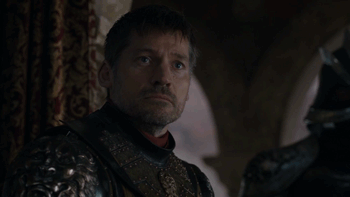
But not all the show's siblings are getting on, and after threatening Tyrion with death, Cersei is on a roll. Jaime is, for some reason, surprised that instead of keeping her word Cersei has no actual intention of zombie fighting. Jaime has had quite the arc this season, one that has driven him away (perhaps forever) from his twin, lover, and baby mama. As I wrote about previously, Jaime is the archetypal white knight. He is one of the few characters not motivated by greed or self-promotion, but rather a warped familial love.. While he has acted cruelly and cowardly in the past, he is not characteristically cruel or a coward. This season he has witnessed true horror in the form of fiery dragon death, the vengeful Olenna Tyrell, and the true depth of Cersei's darkness. He seems to finally realize that what he perceived as righteous action motivated by true love may have been in service to the wrong side. A Jaime Lannister unmoored from his familial duty is as compelling a wildcard as any, and it will be interesting to watch his journey continue to unfold hopefully in a Northerly direction.

Well, we've come to it. There's nothing left to talk about. Sam and Gilly arrive back at Winterfell just in time for Sam to have an exposition-off with the Three Eyed Arse-Face. Sam proceeds to take credit for Gilly's breaking news, and together with Bran's "vision power" the two explicitly spell out the true nature of Jon's identity. None of their revelations are a surprise to viewers of the show, beyond chiseling 'Aegon Taragaryen" into canon. No, the bigger surprise was that this narration was the voice over to Jon and Dany getting it on on her pleasure yacht. While we heard definitive proof that Dany is in fact Jon's Aunt, we watched their supple bootied bodies writhe around together. What emotion was I supposed to be feeling during this scene? I am honestly asking. Because the emotion I was feeling was void. The absence of feeling. "Jon needs to know." Yeah ya think Bran? With all that you can see you couldn't see that you should have told him this vital, life-altering information just a little bit earlier? Send a goddamn raven since they travel at the speed of light. Jesus Seven Hells Christ.

Also there were many happy romantic flashbacks of Rhaegar marrying Lyanna, but it's super fucked up that Rhaegar ditched his first wife and children to have a SECOND child name Aegon. Like what the fuck is that Rhaegar?? Granted the first Aegon (along with his sister and mother) were horribly murdered by the Mountain, so I guess it was good he decided to make a spare. Oh sorry Jimmy, I decided to have another son with my new wife, who I like more than Mommy, and his name is also going to be Jimmy. If family therapy existed in Westeros, we would probably be in a very different place politically.

Finally, finally we end for with the Night King's arrival at the wall. The new zombie ice dragon is locked and loaded and it BREATHES BLUE FIRE. The blue fire was pretty cool, and I eagerly await it's use in the dragon on dragon throw down that will inevitably occur next season. With the power of blue fire the Wall crumbles into the sea, devastating and conclusive proof that wall's are never the answer (no matter how cool and icy they look). I have to wonder though, what was the plan for traversing the Wall without a dragon? The Night King couldn't have known one of the only three dragons in the world would fall into his clutches...what was the contingency plan? Doesn't matter, the Wall is down and I'm going to need a wellness check on Ginger Beard.
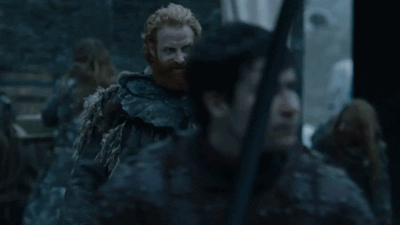
Well that's it friends, season seven! If our own nuclear winter hasn't come I'll see you back here in.....two years..... Miss ya!
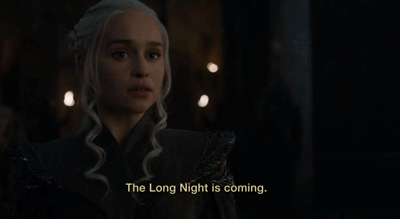
Things I didn't get to:
Clegane-bowl pre-game?
Probably could have thought of some more derogatory things to say about Bran.
Cersei's fake out Stark-alliance fur-lined dress.
What happened to Gendry?

MVP: You. You made it.
XO MD
P.S. if you want to talk to me on Twitter about incest and shitty Westerosi parenting I'm @marthadee.
#martha writes#game of thrones#game of thrones gif#game of thrones recap#game of thrones reviews#tv reviews#tv recaps#tv gifs#stark sisters#sansa stark#sophie turner#arya stark#Maisie Williams#lyanna stark#rhaegar targaryen#aegon targaryen#jon snow#kit harrington#do he got the booty?#he do#daenerys targaryen#emilia clarke#aidan gillen#littlefinger#olenna tyrell#jaime lannister#nikolaj coster waldau#lena headey#cersei lannis#peter dinklage
28 notes
·
View notes